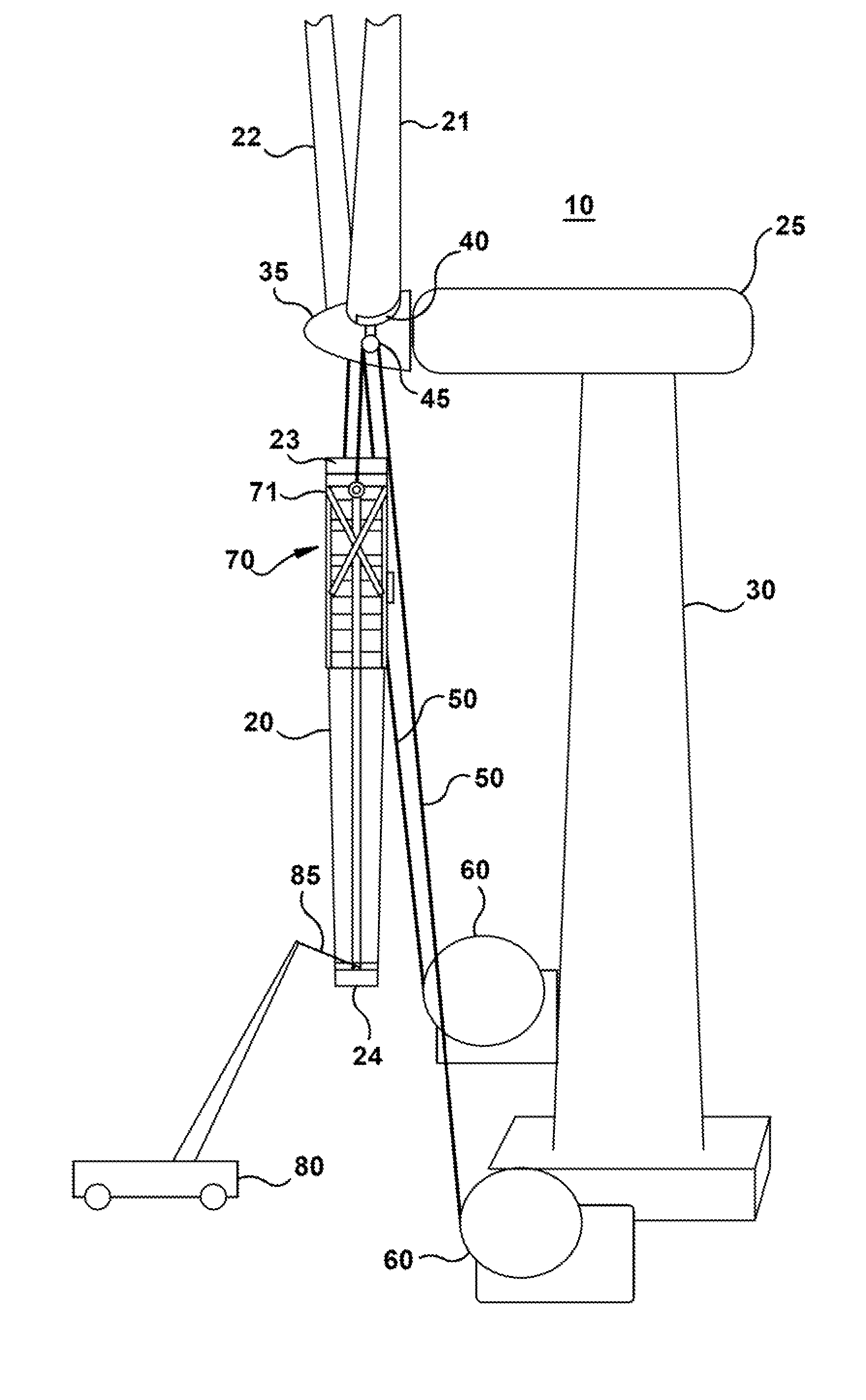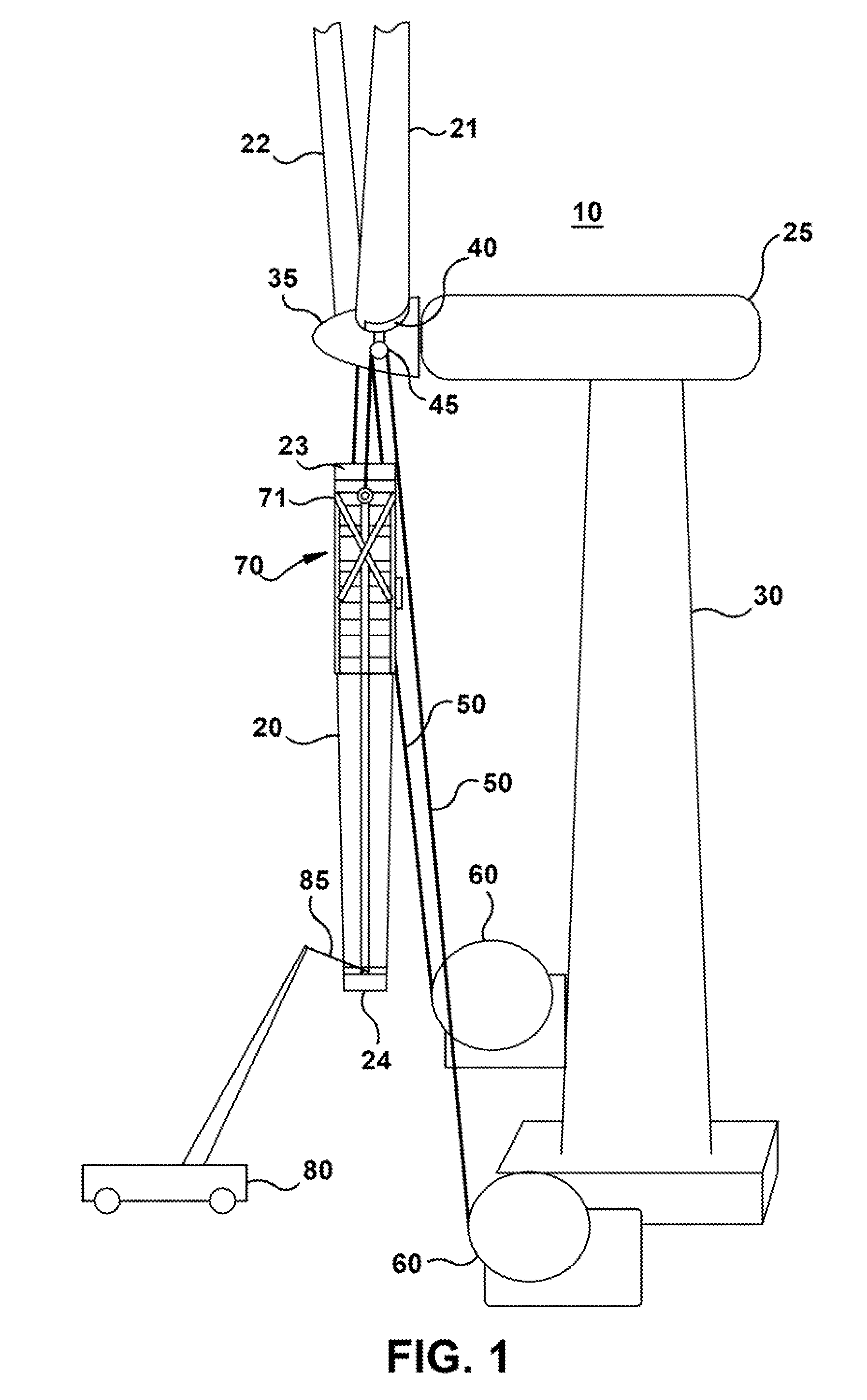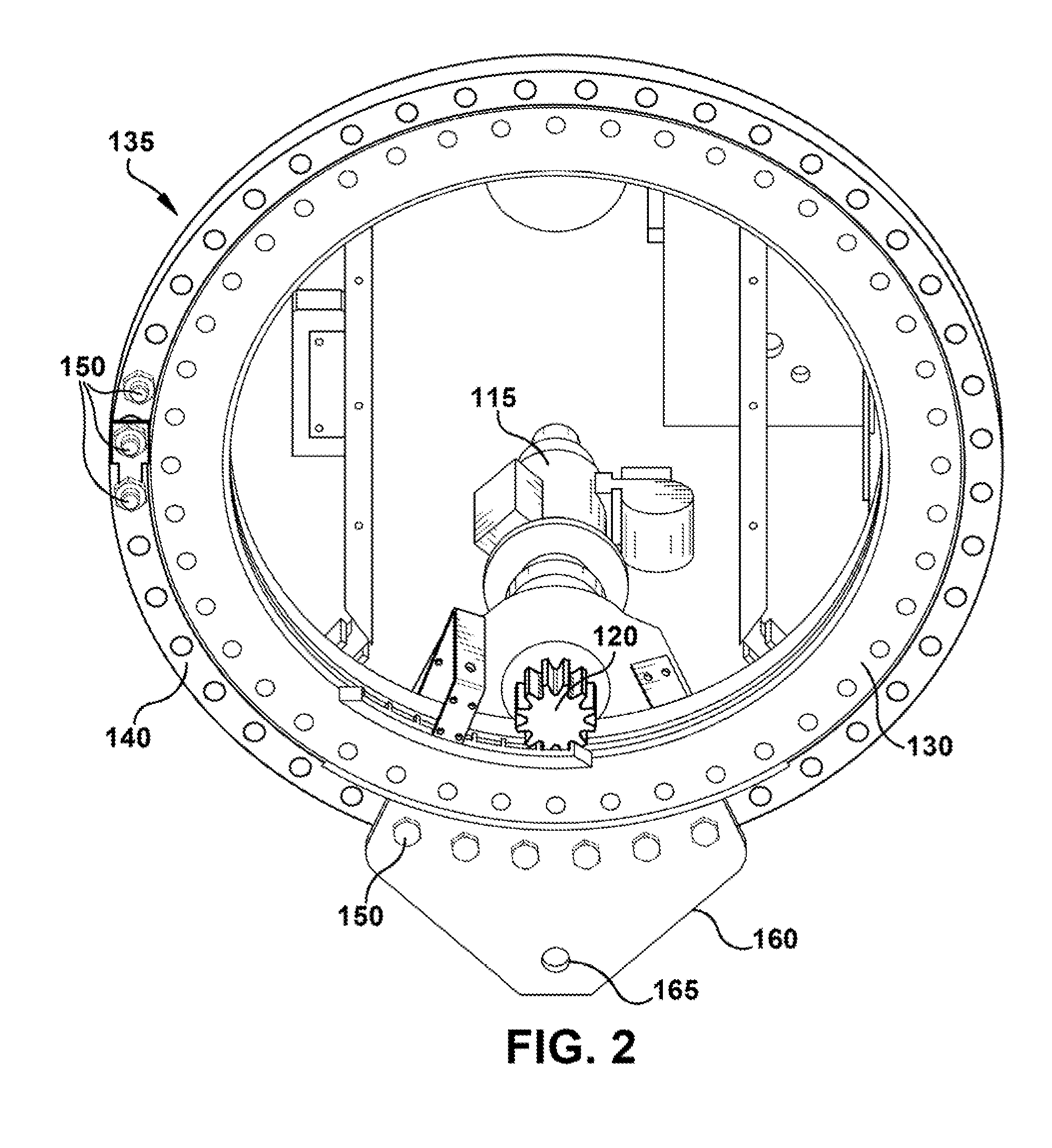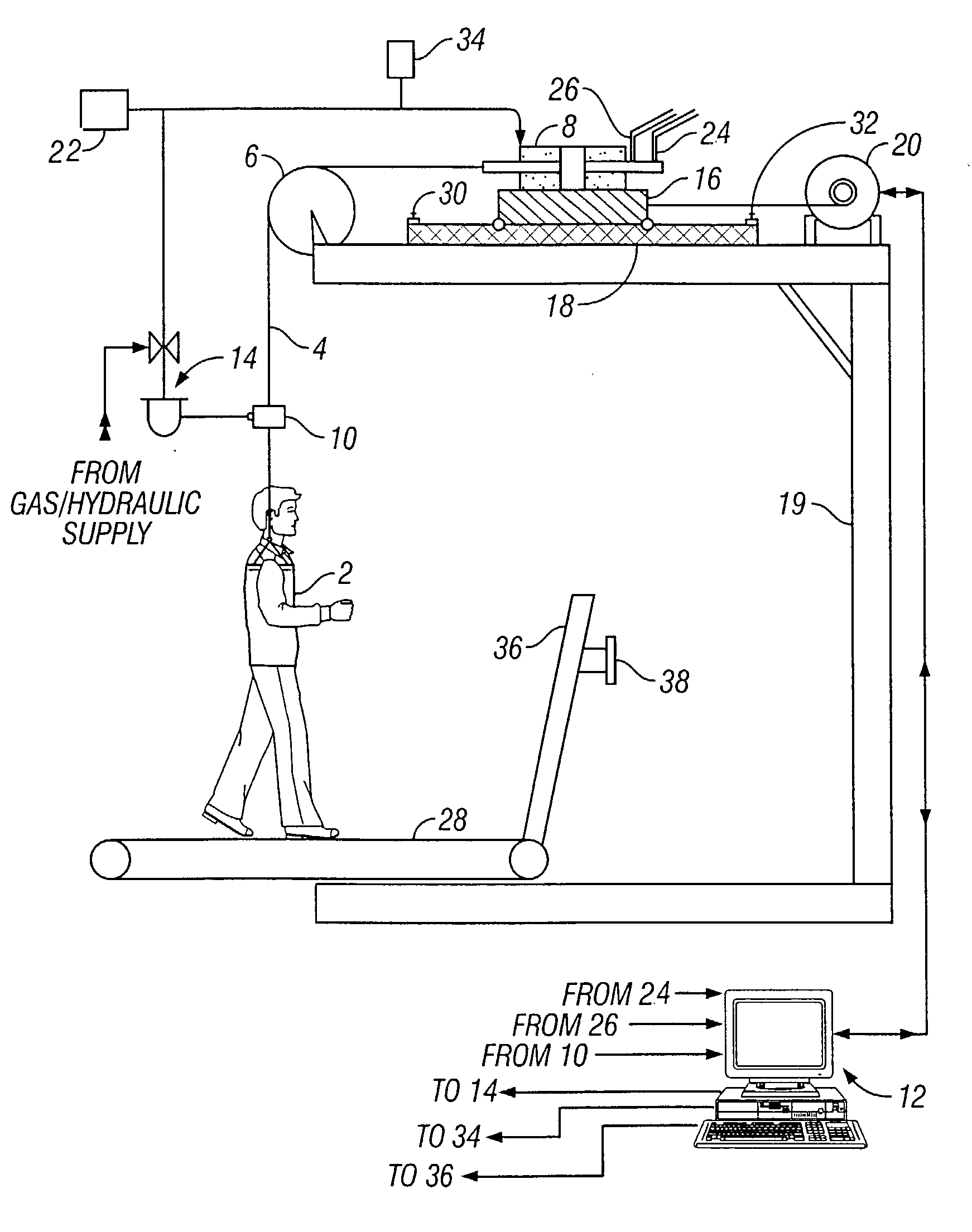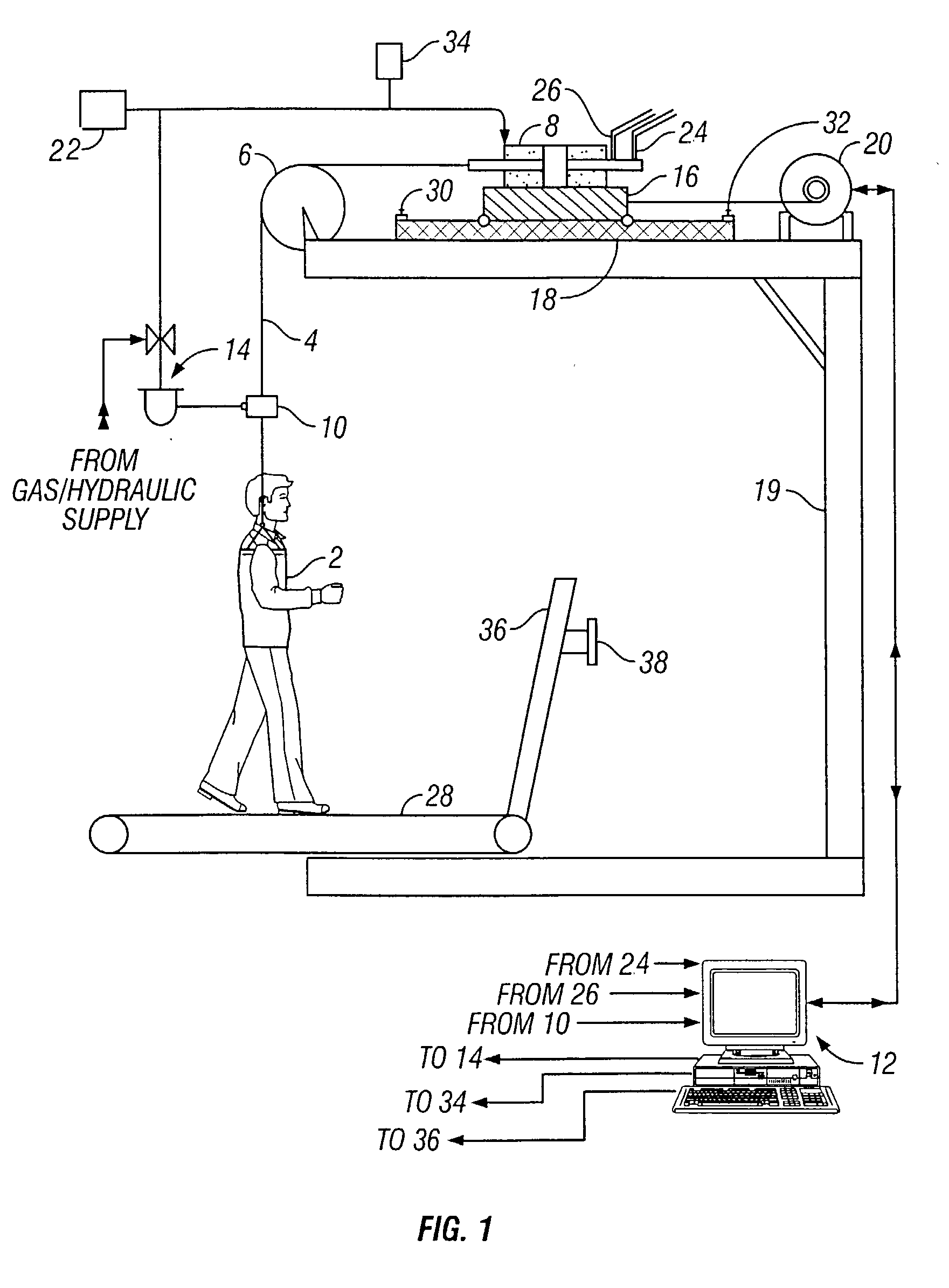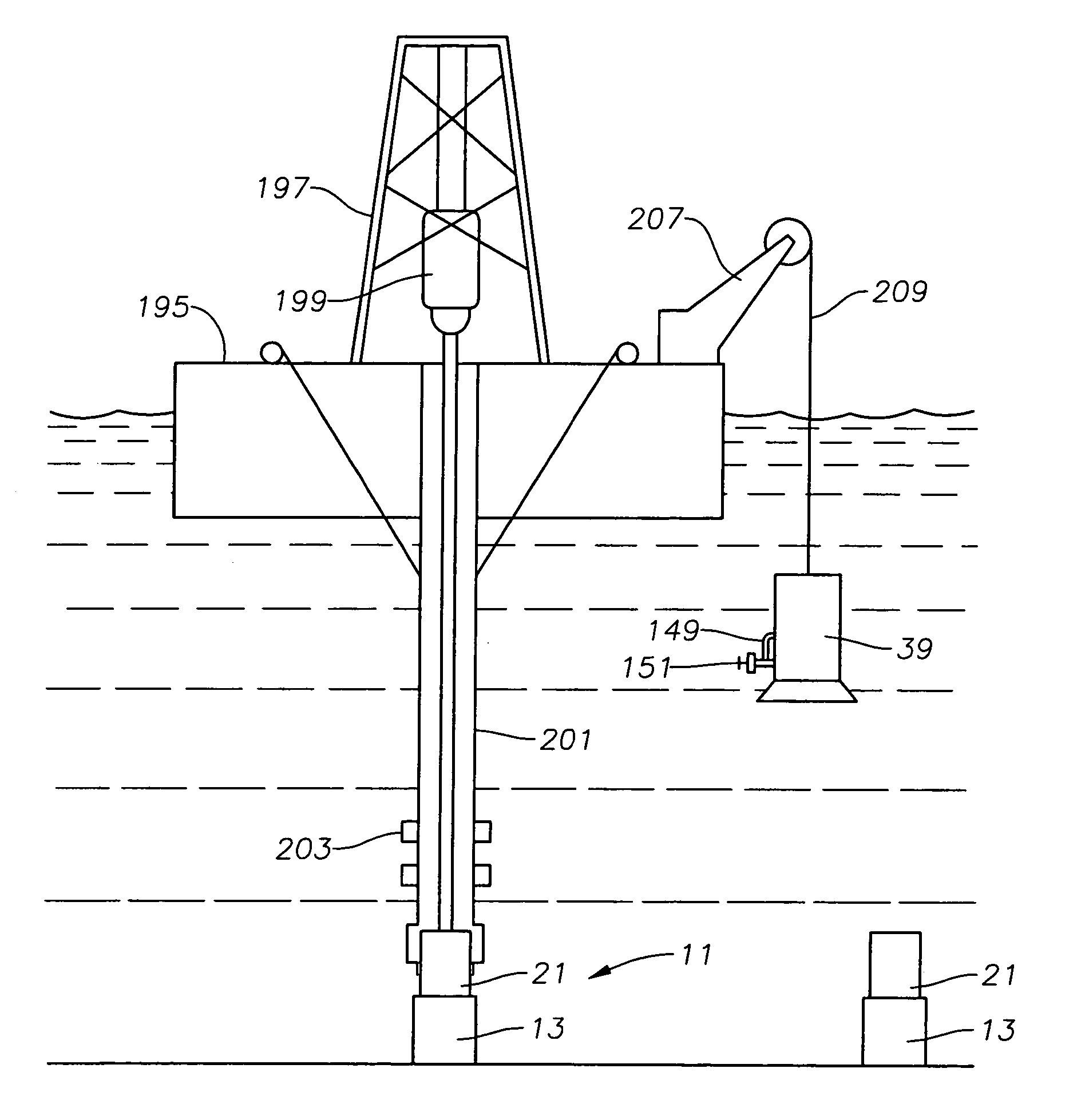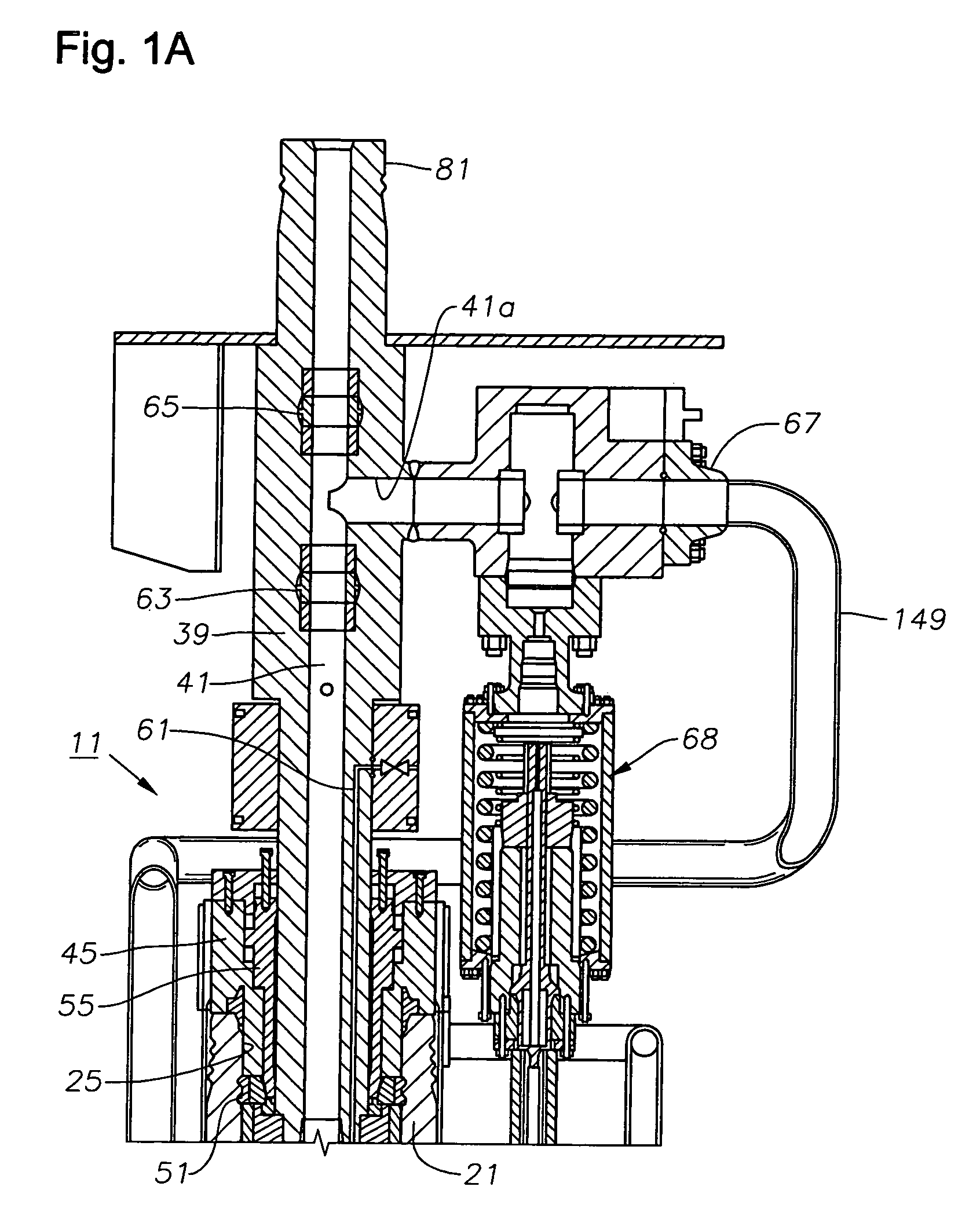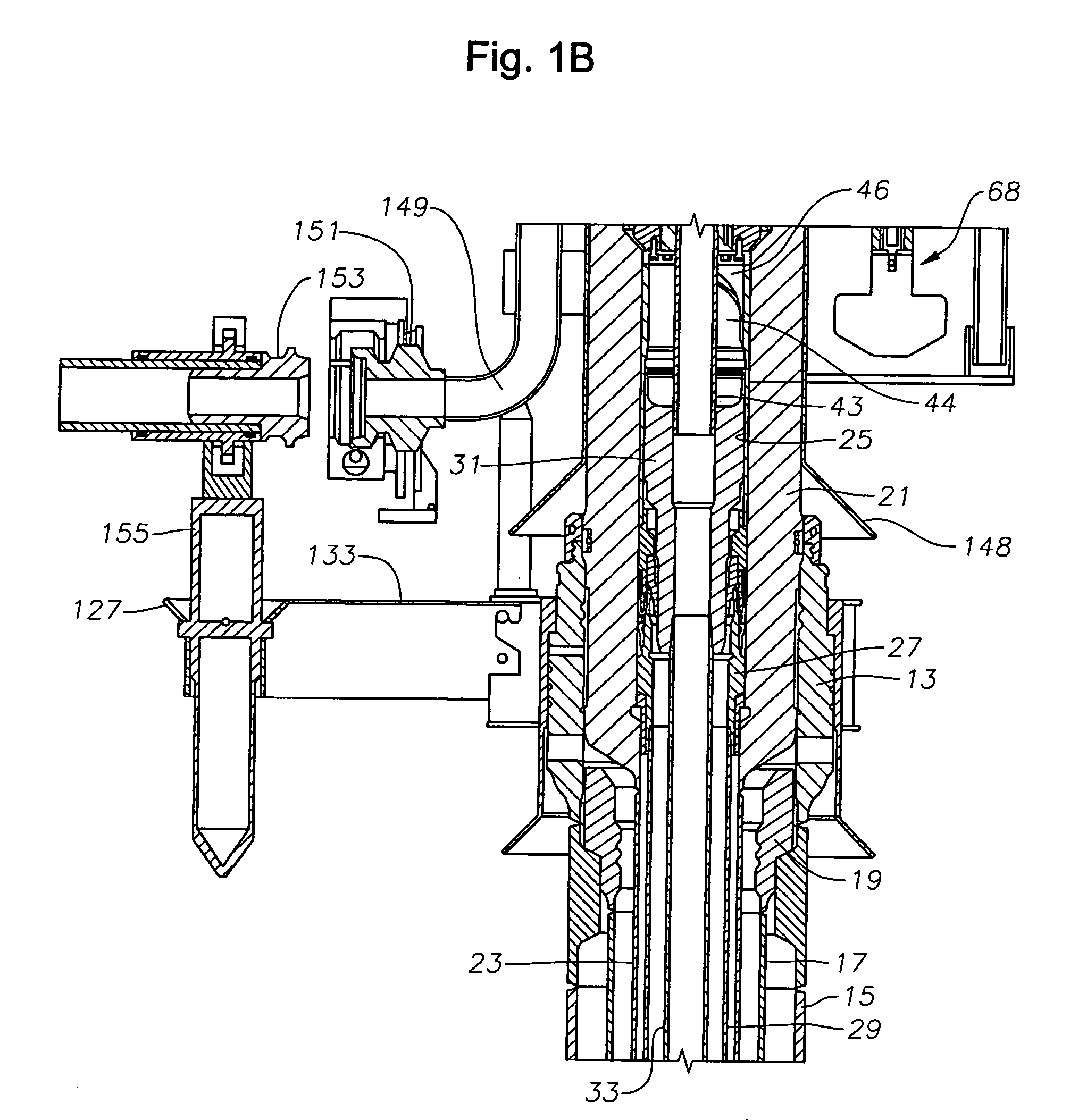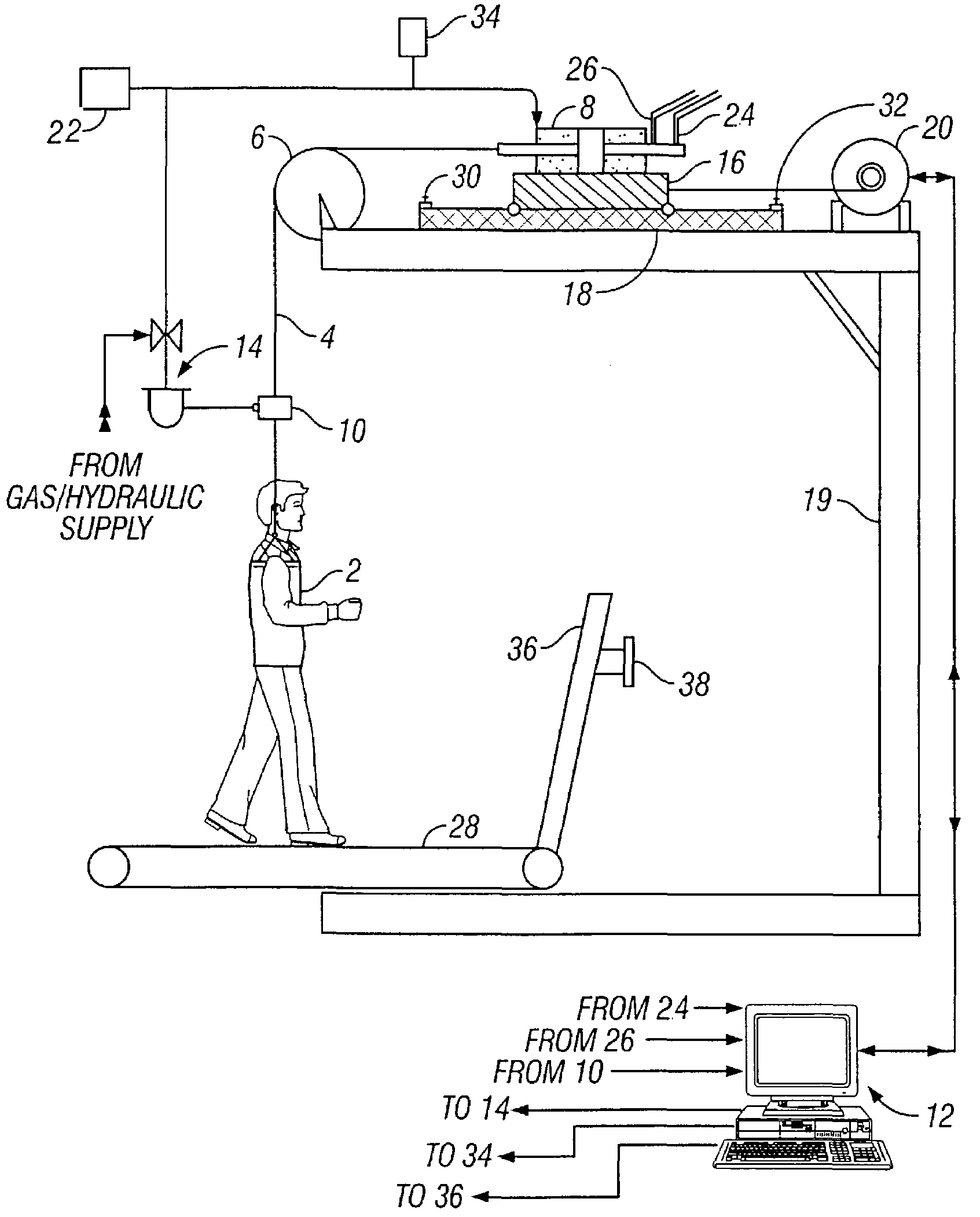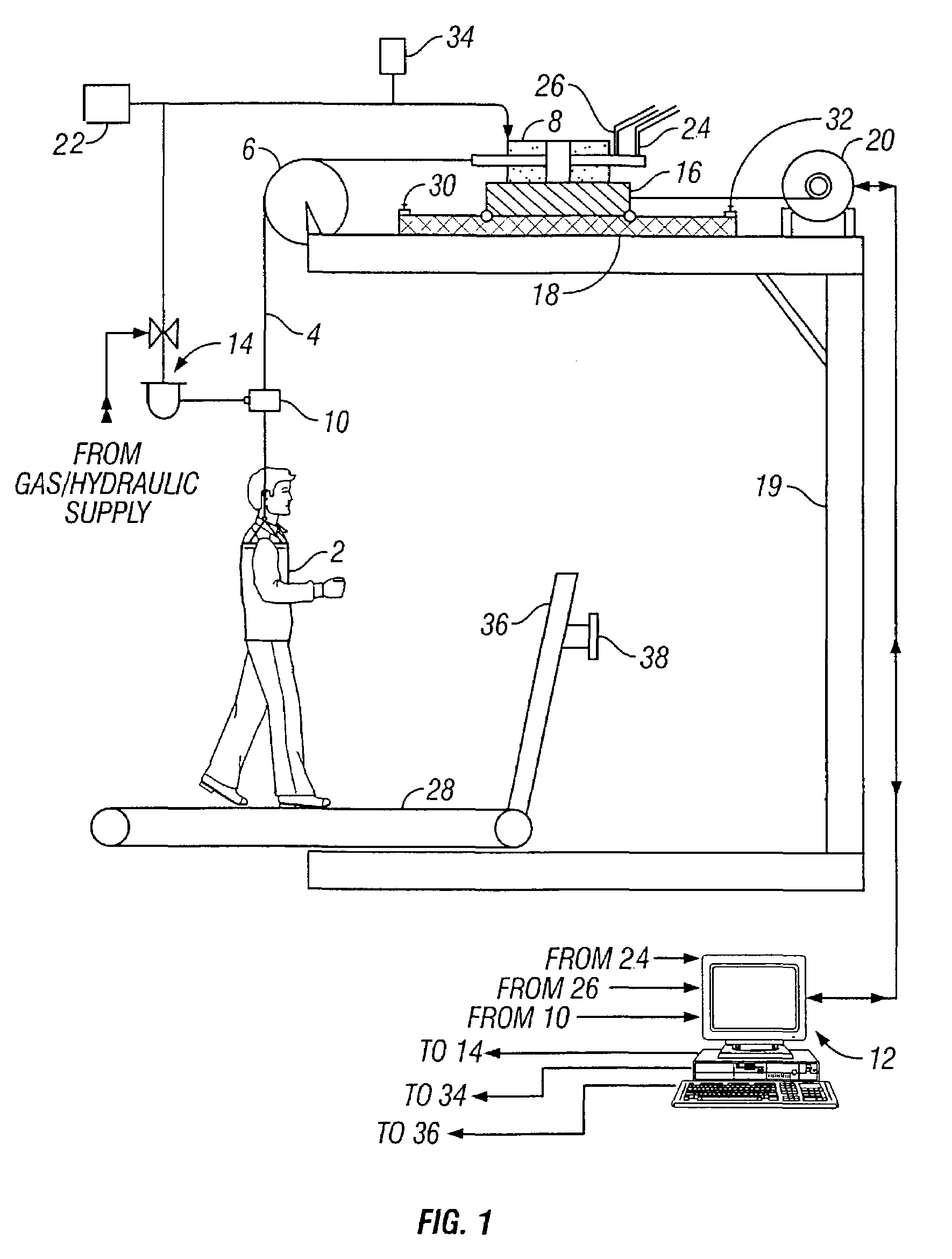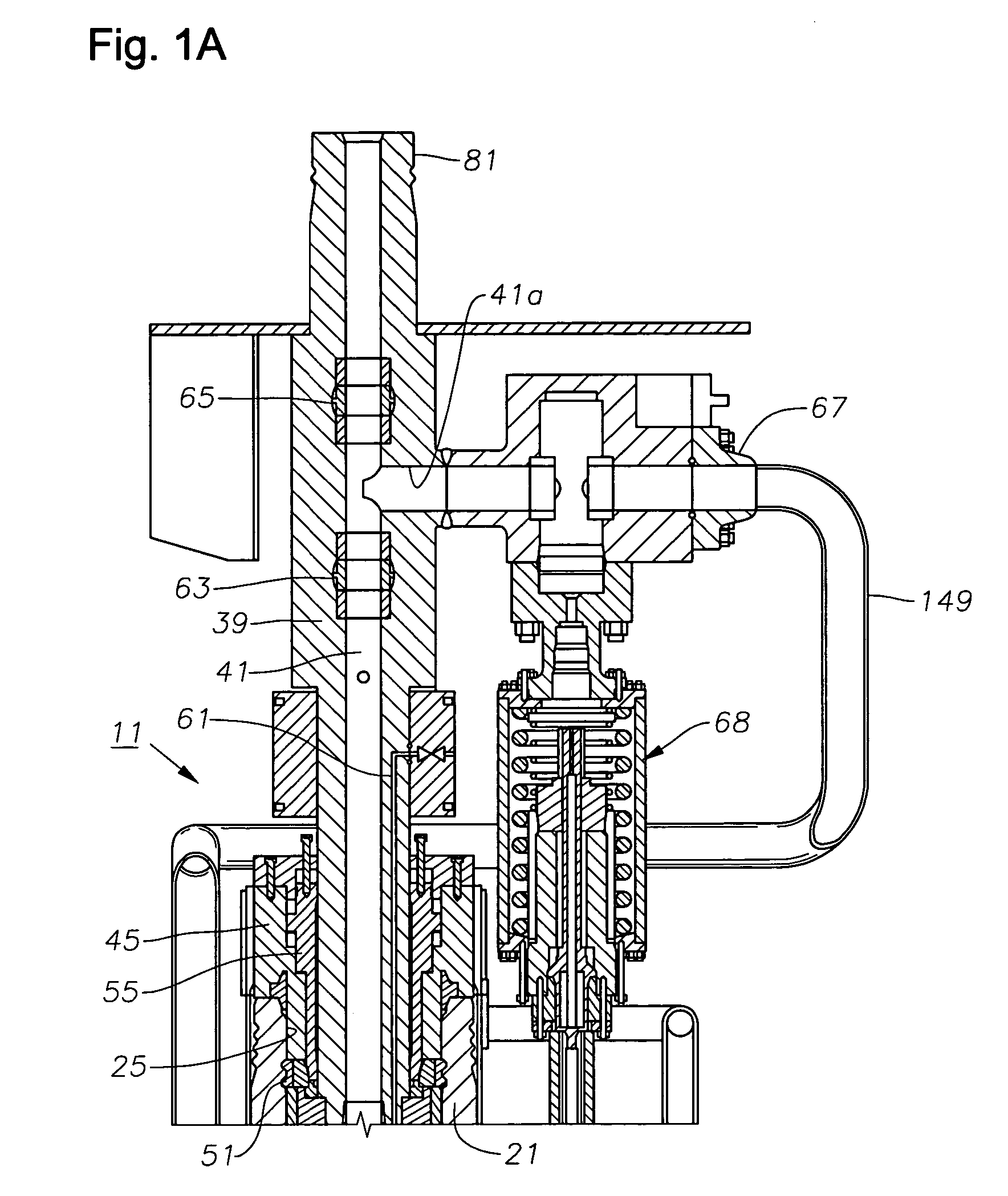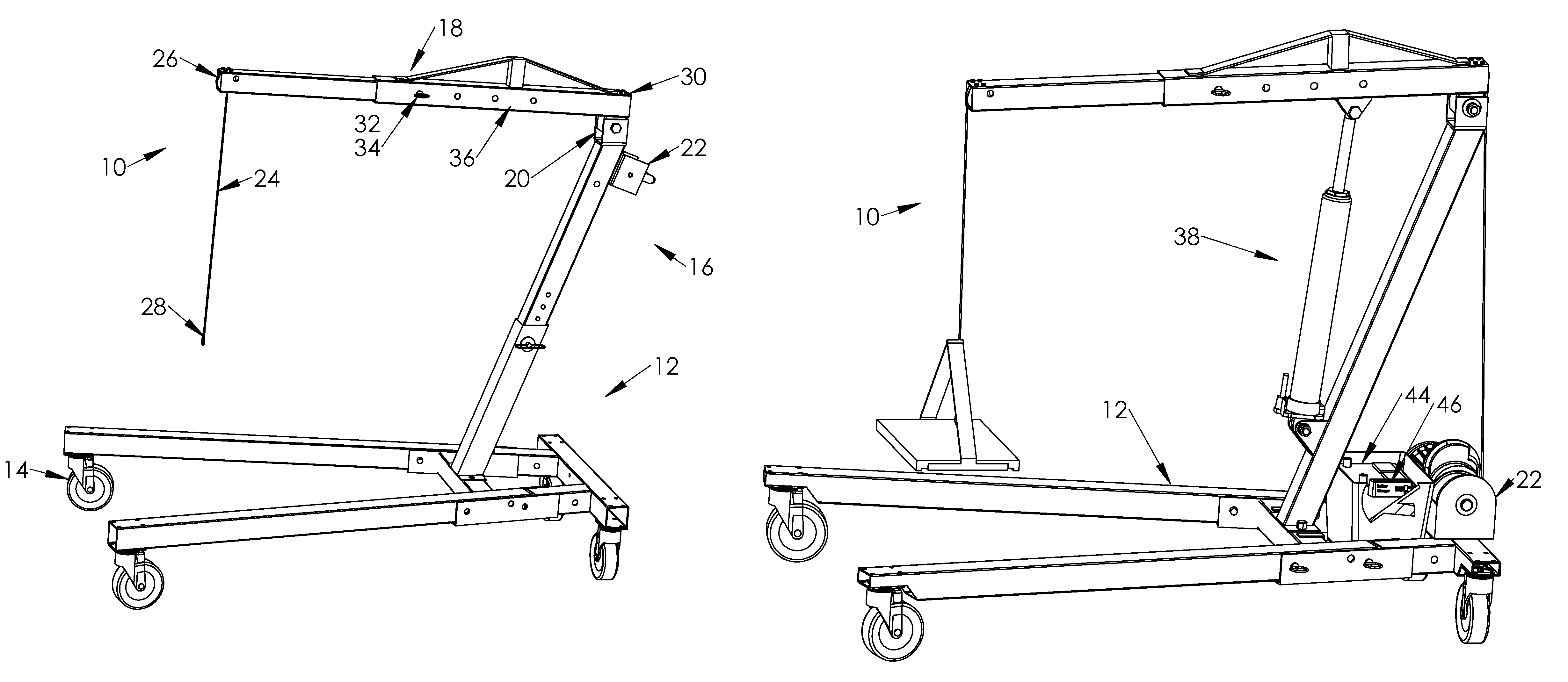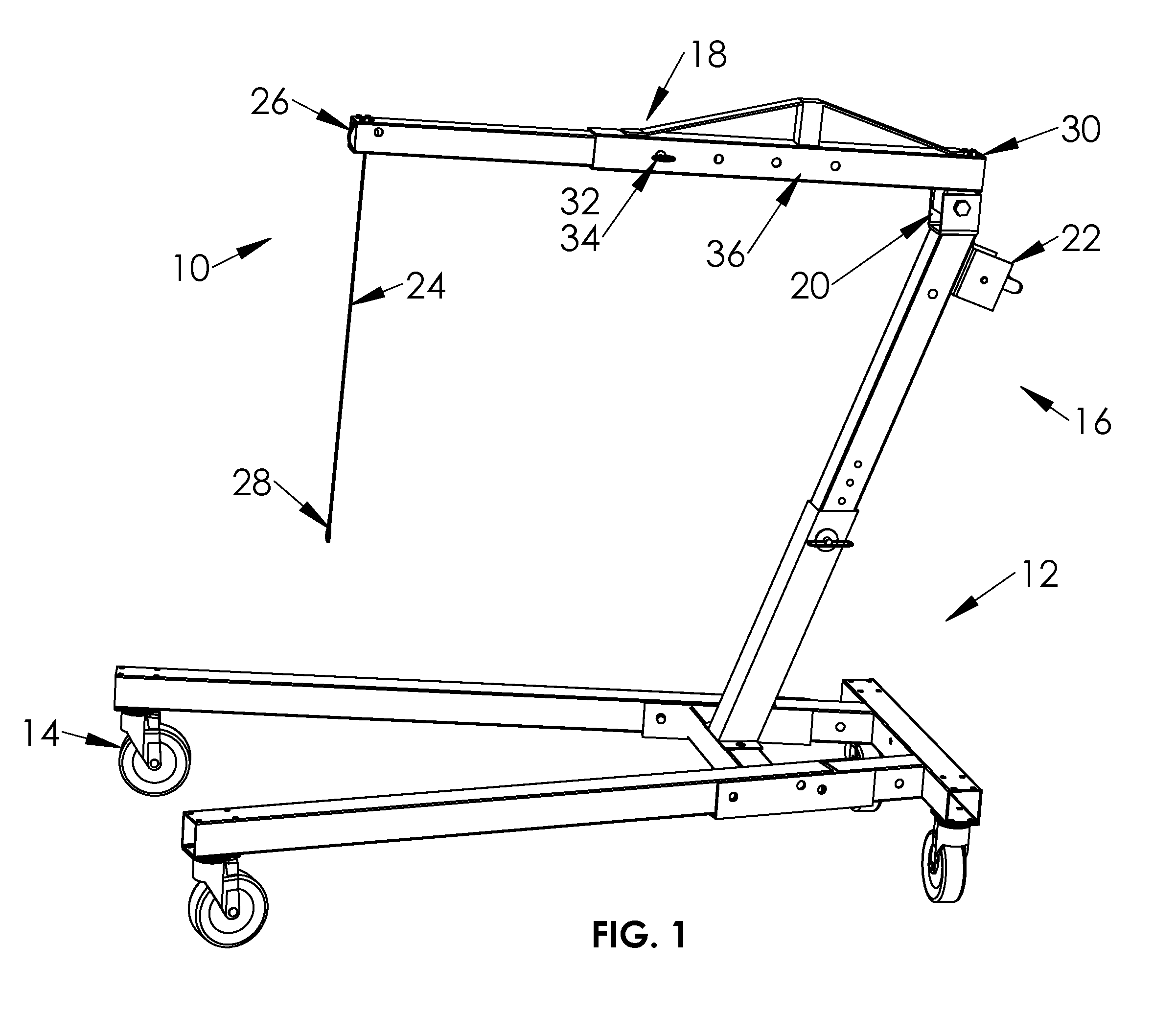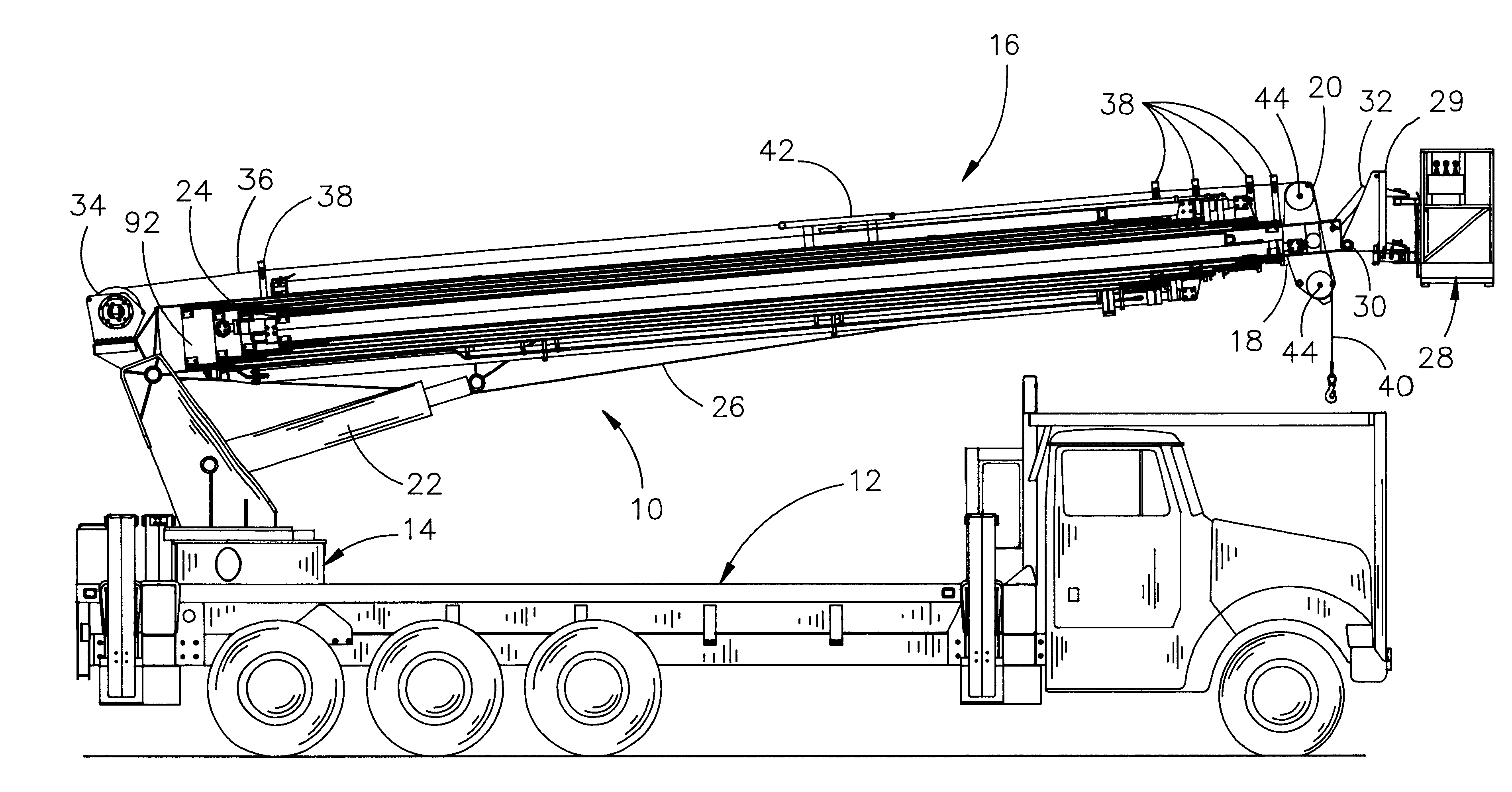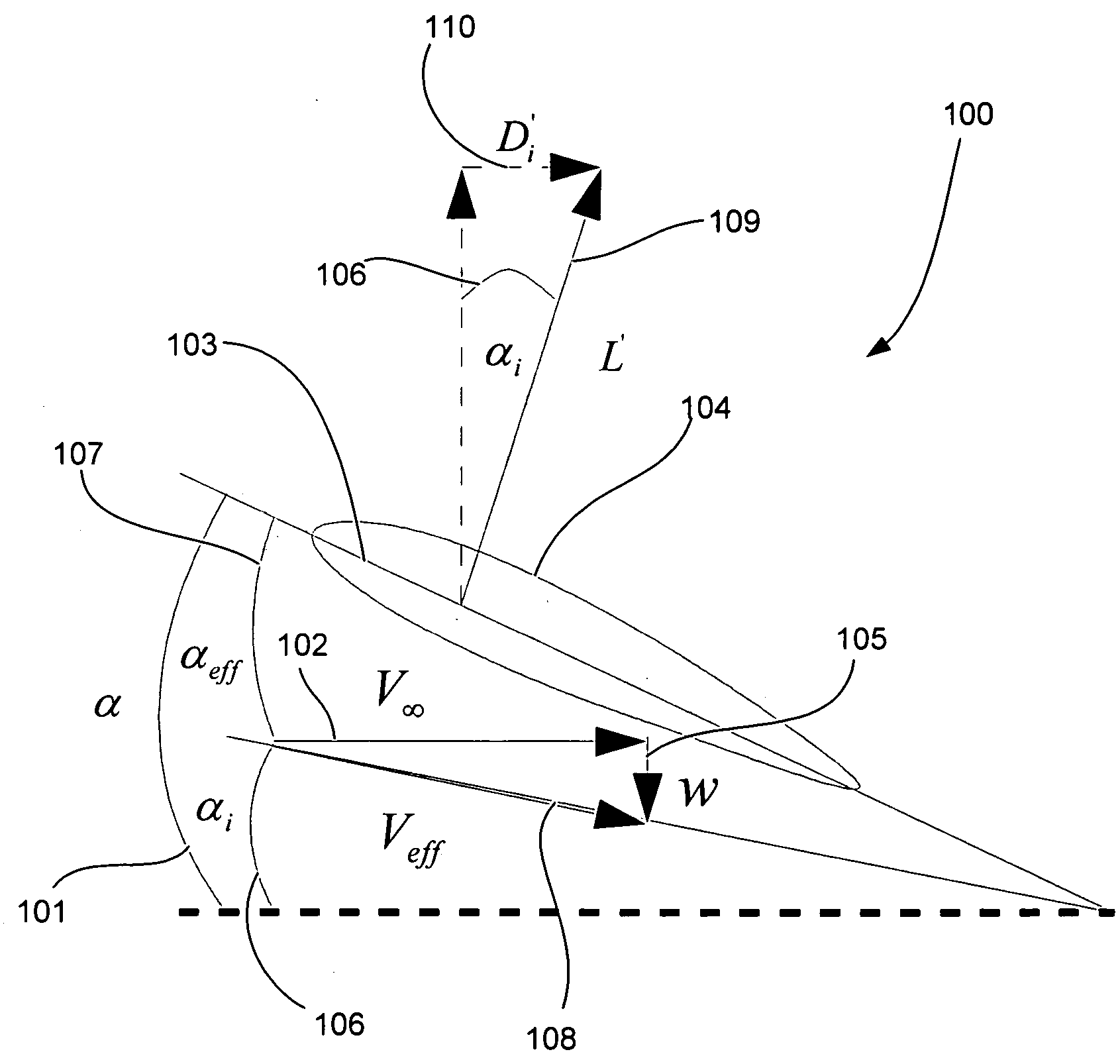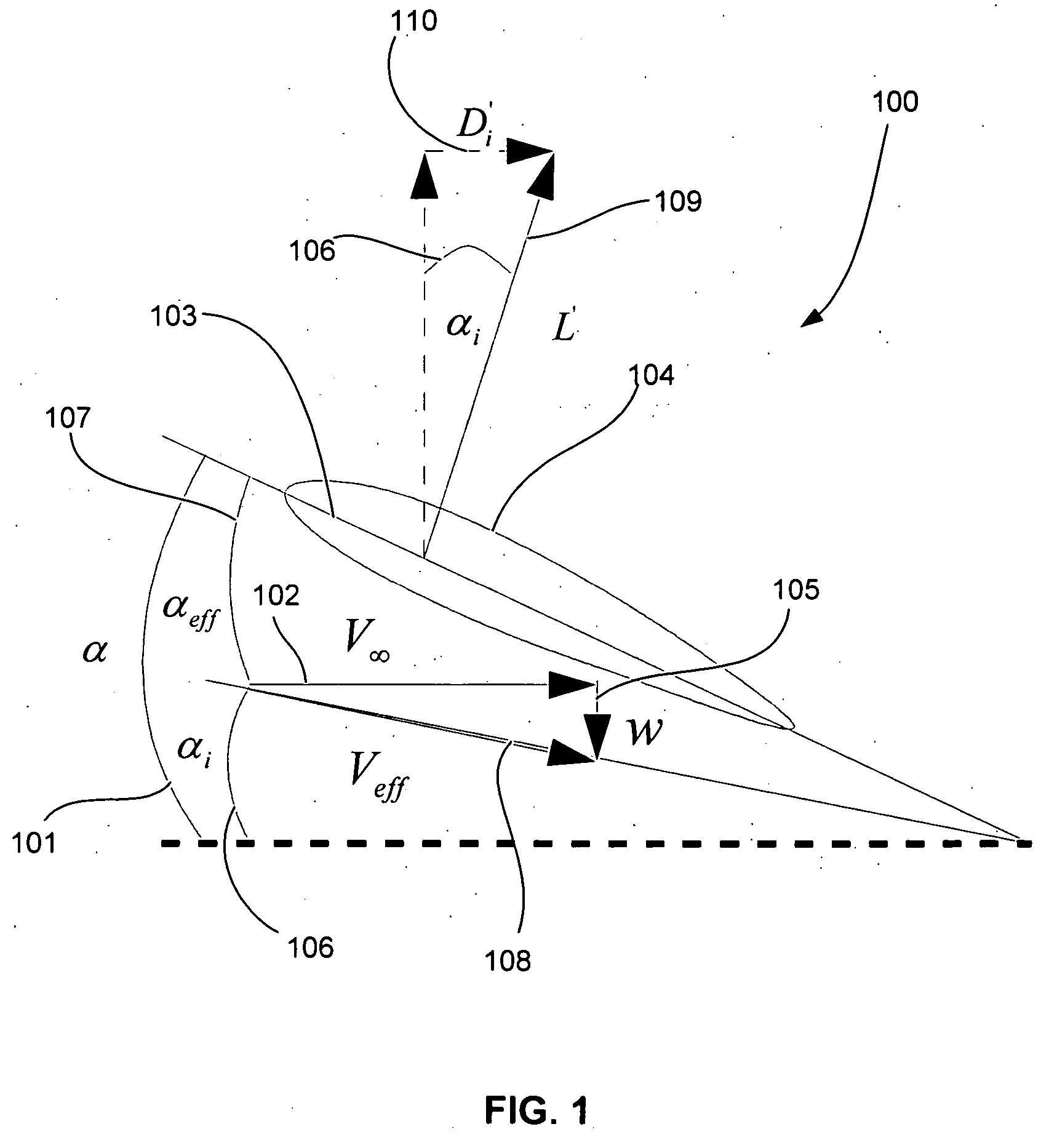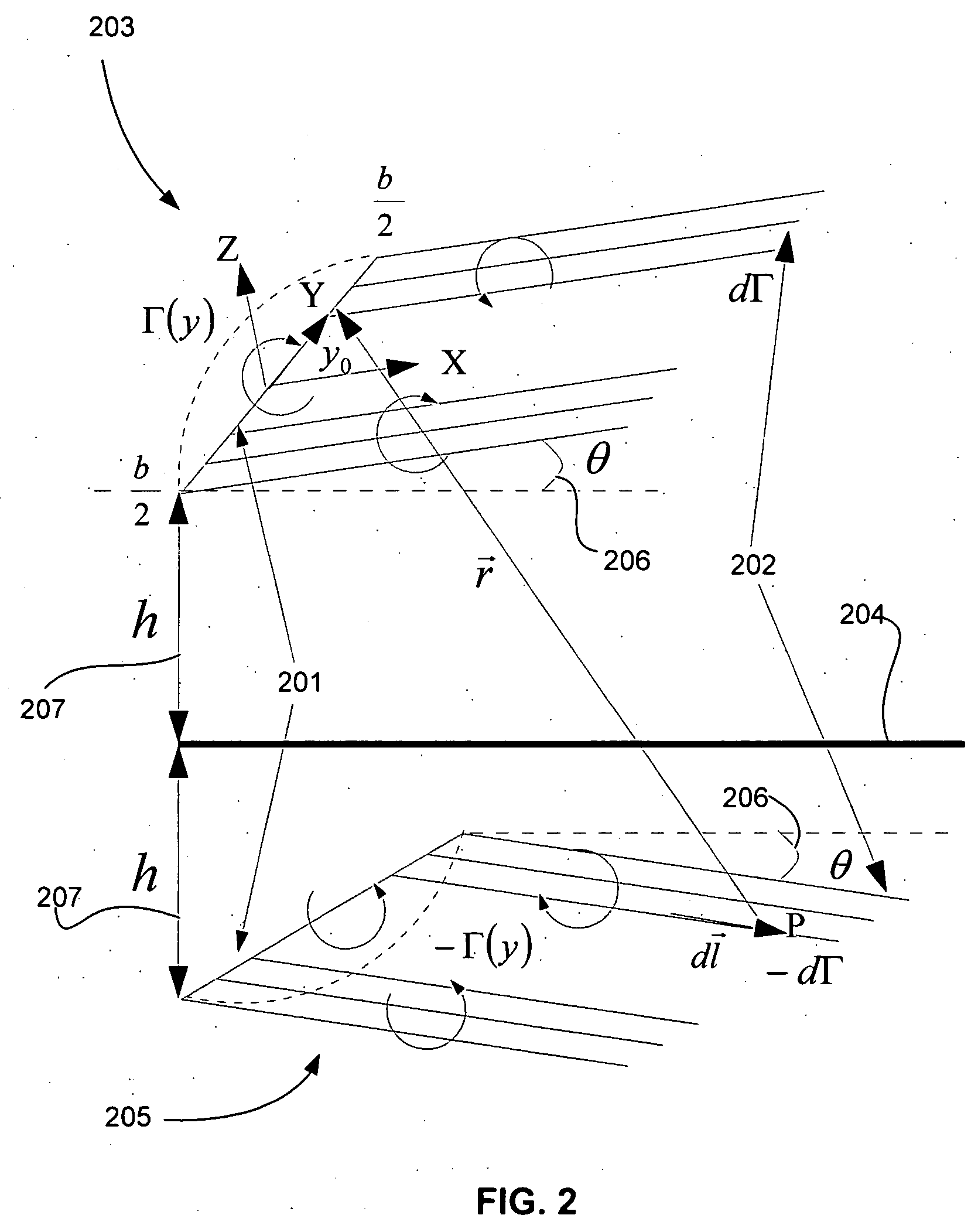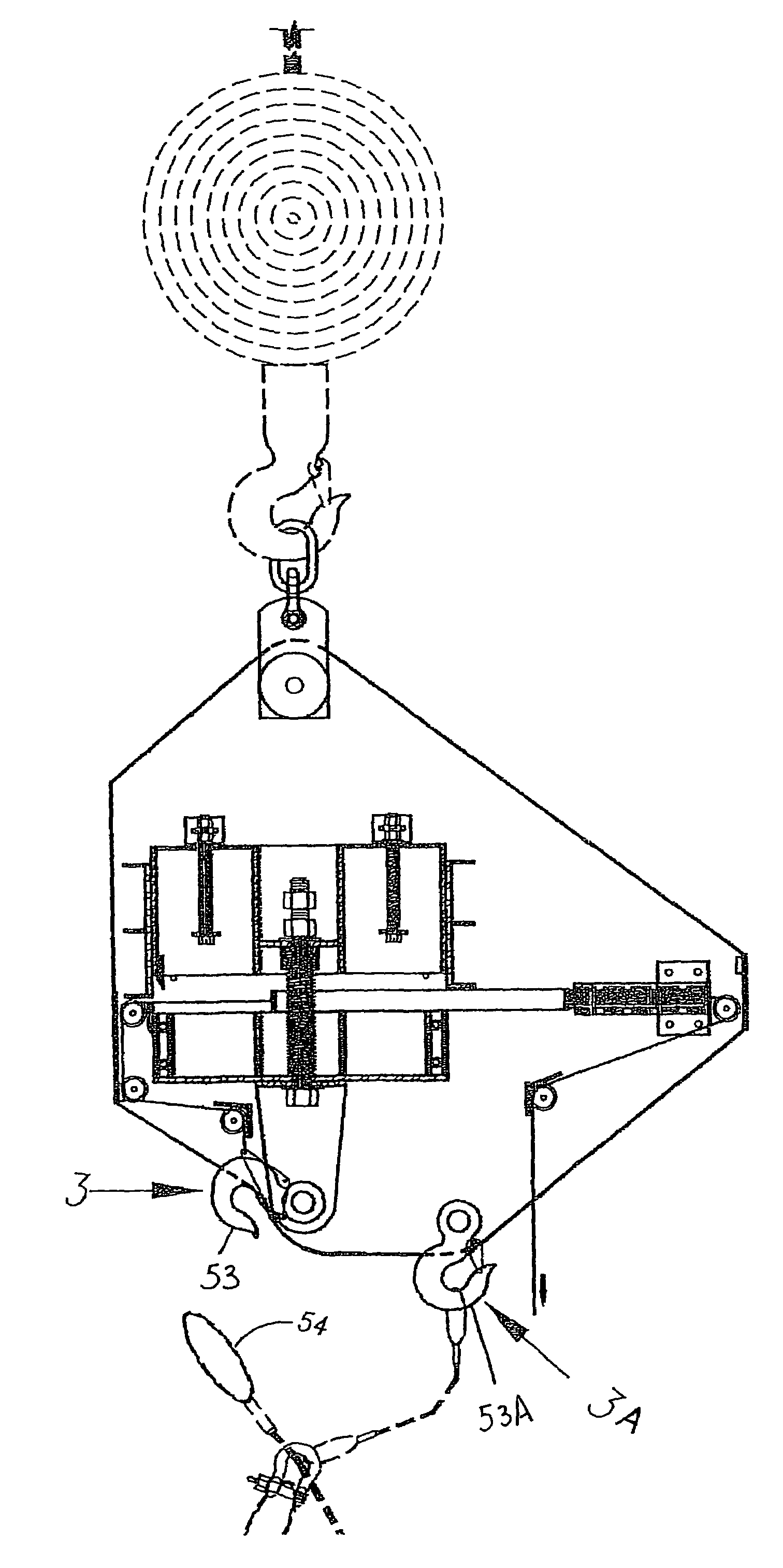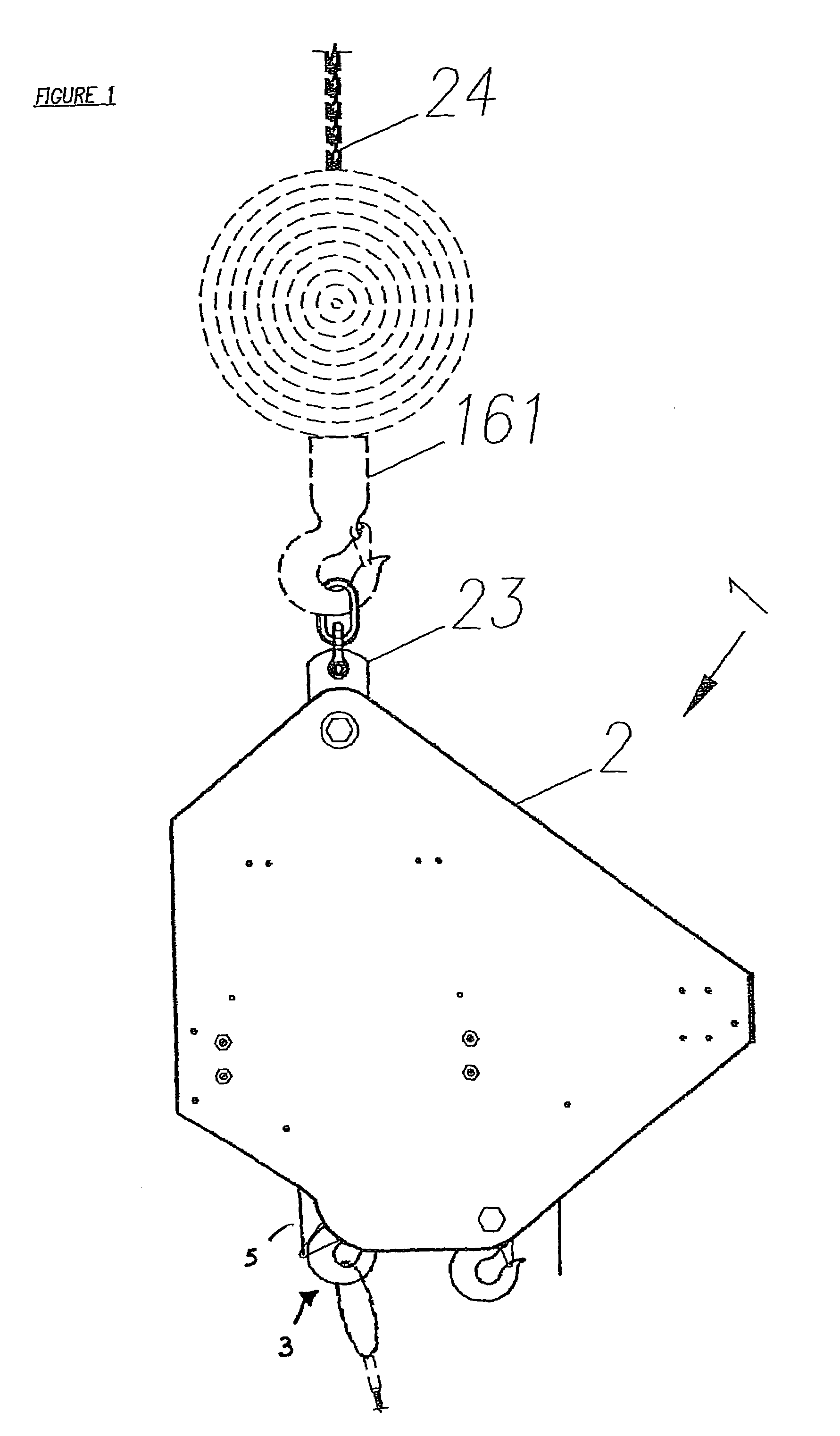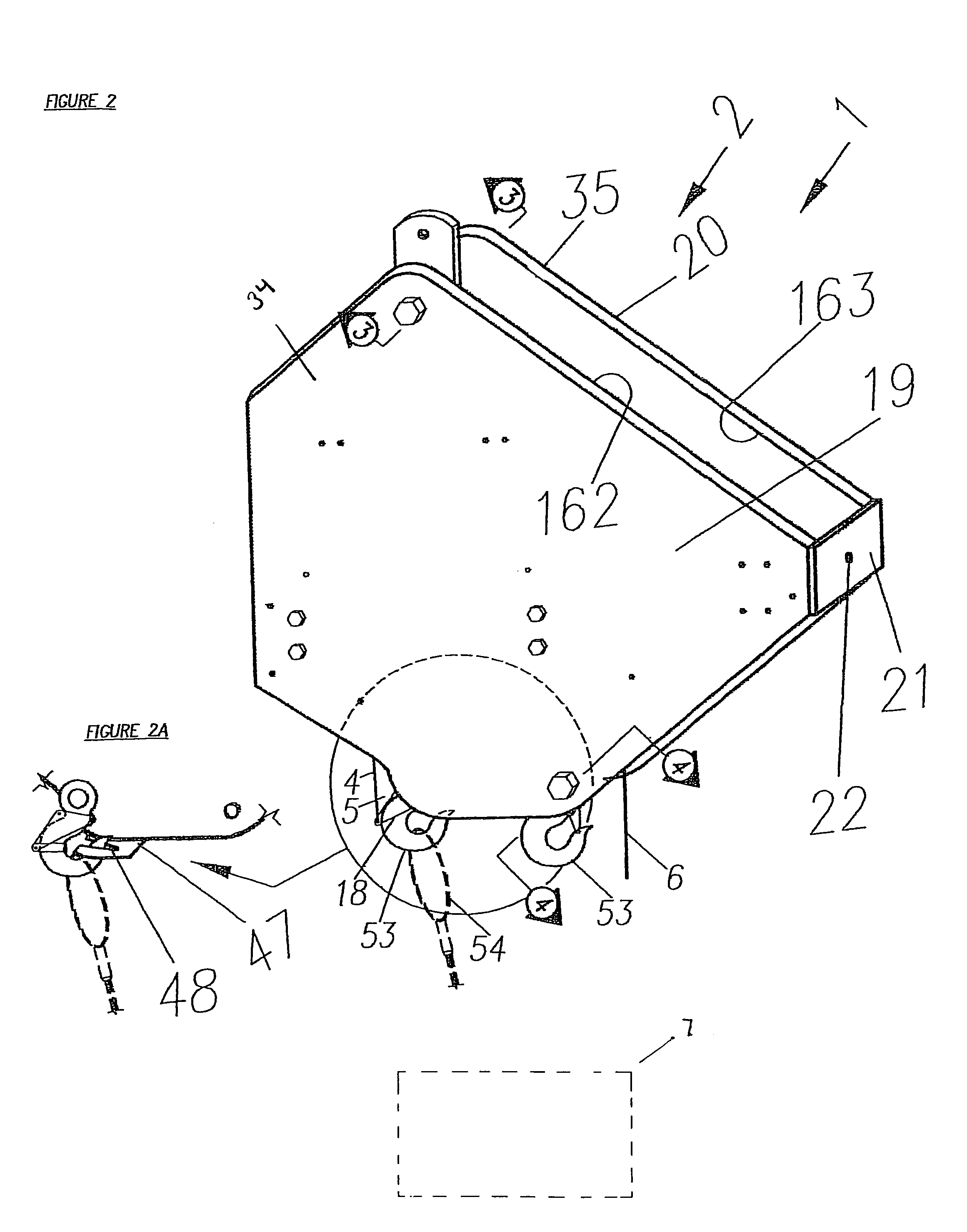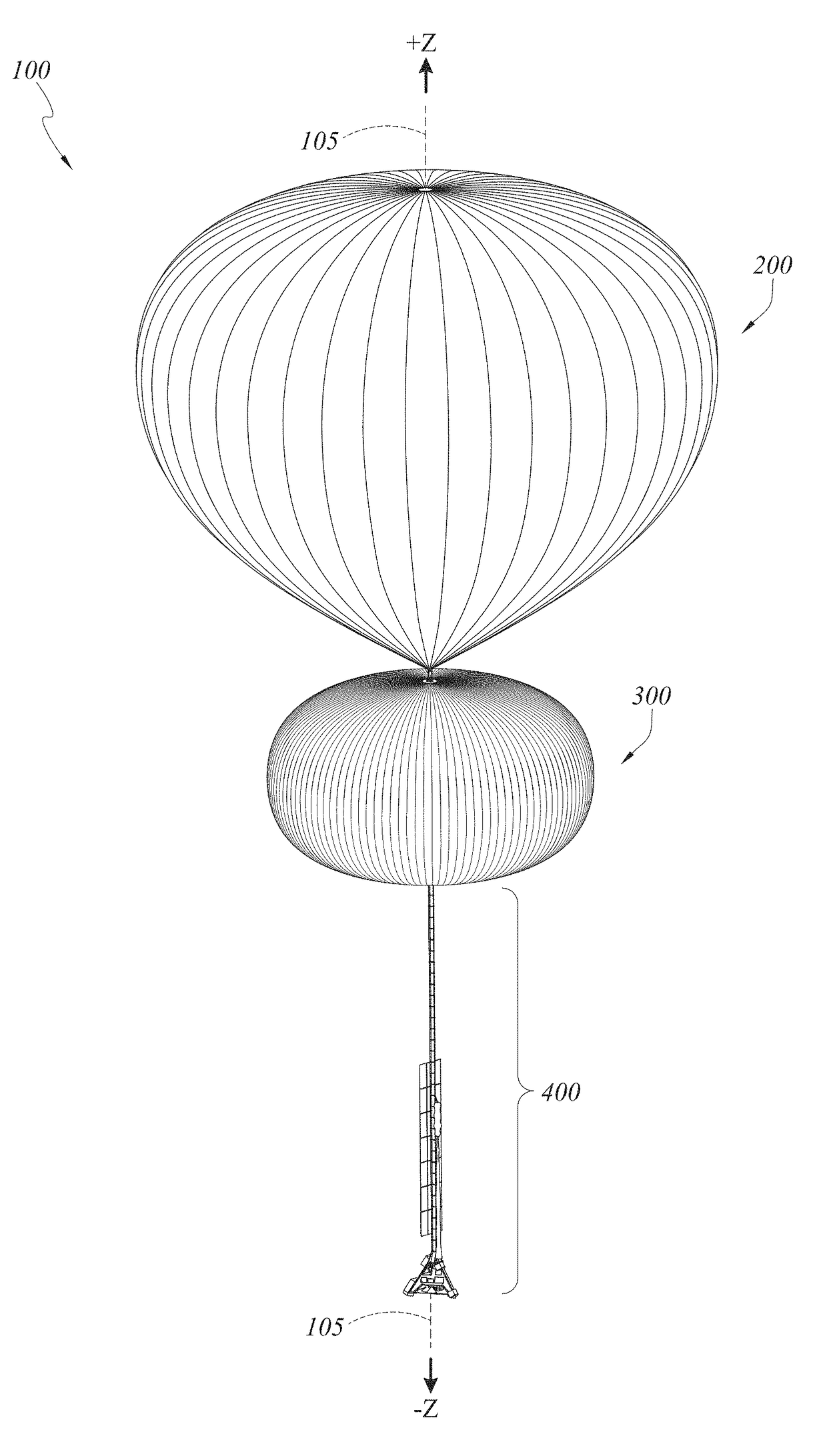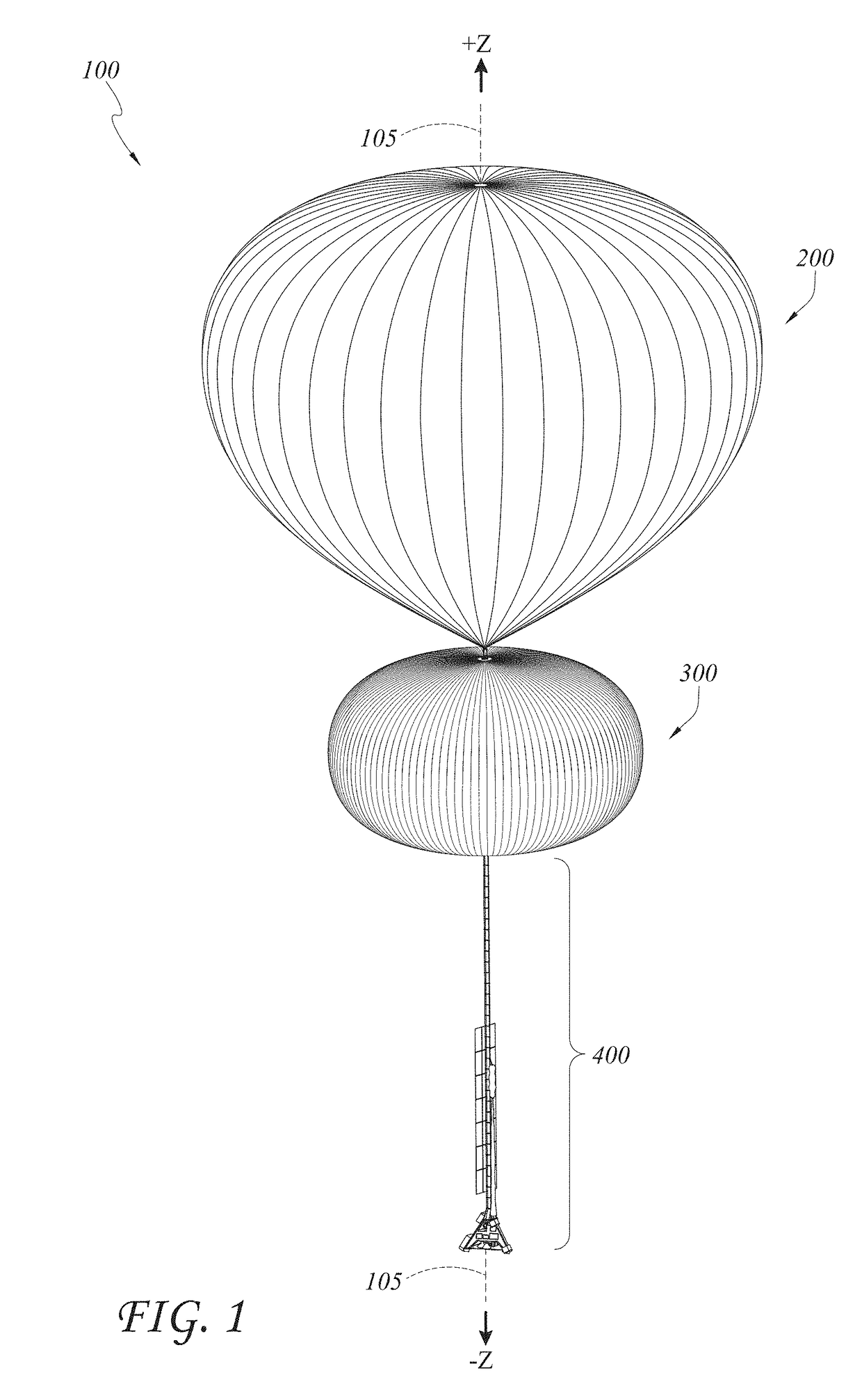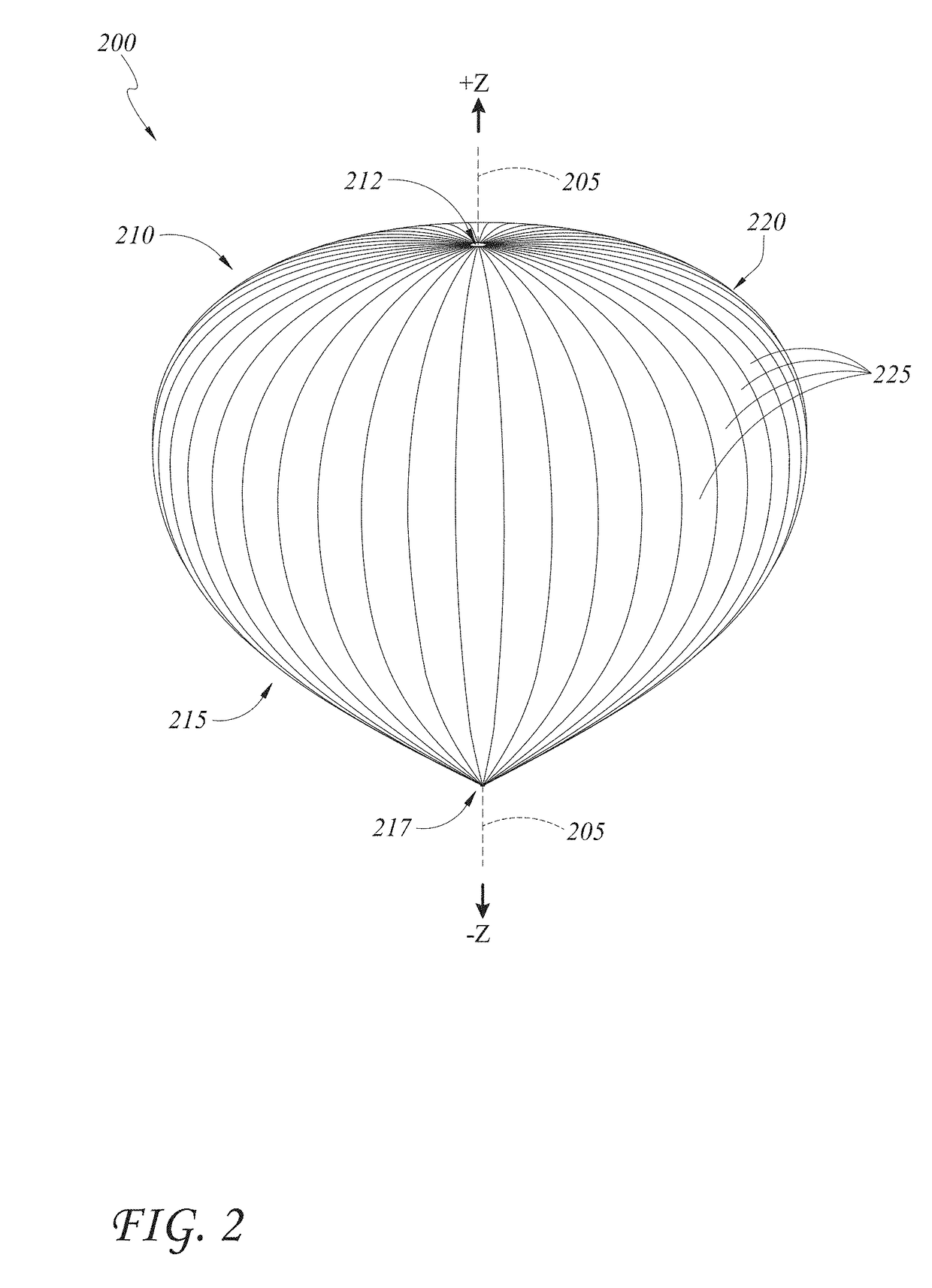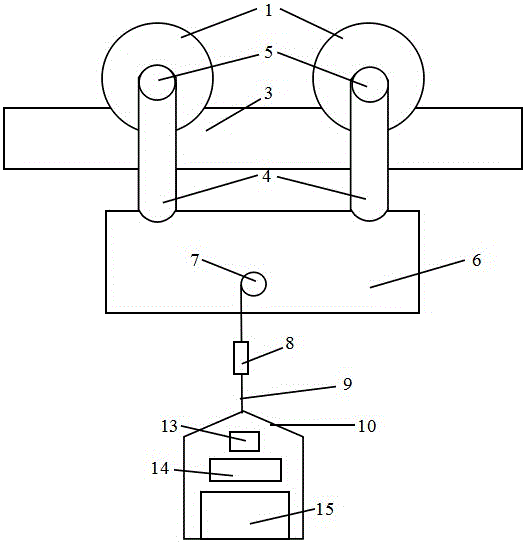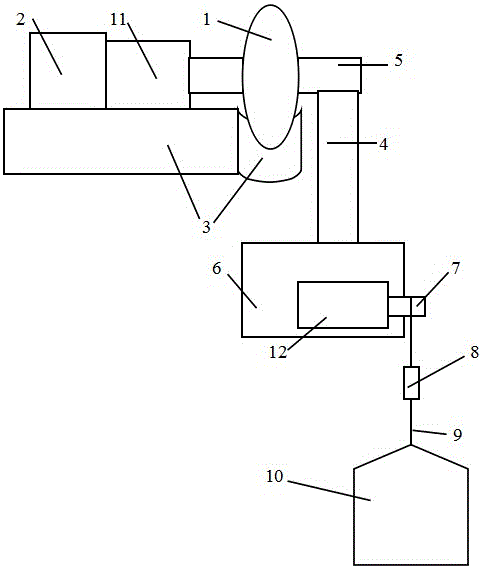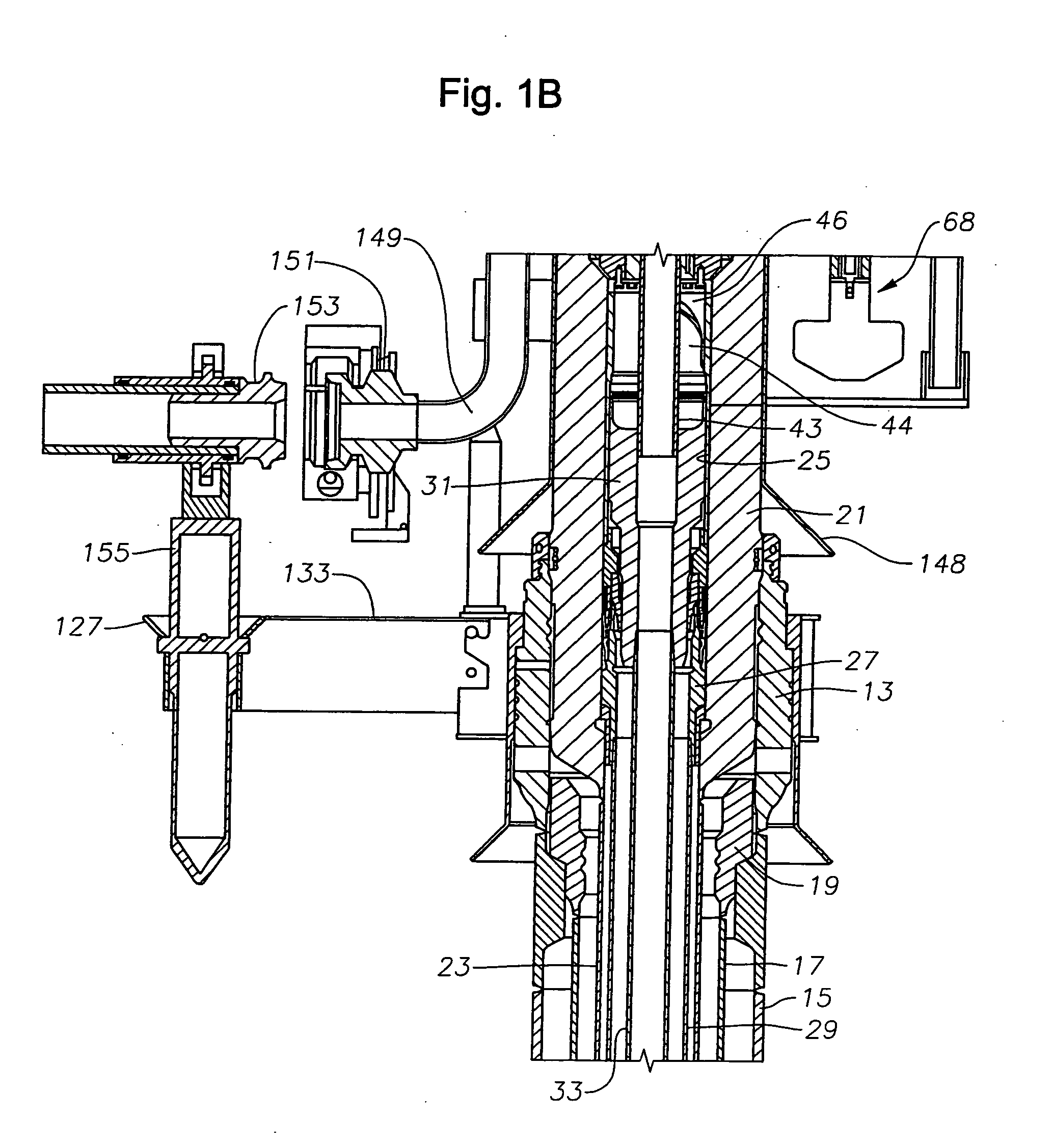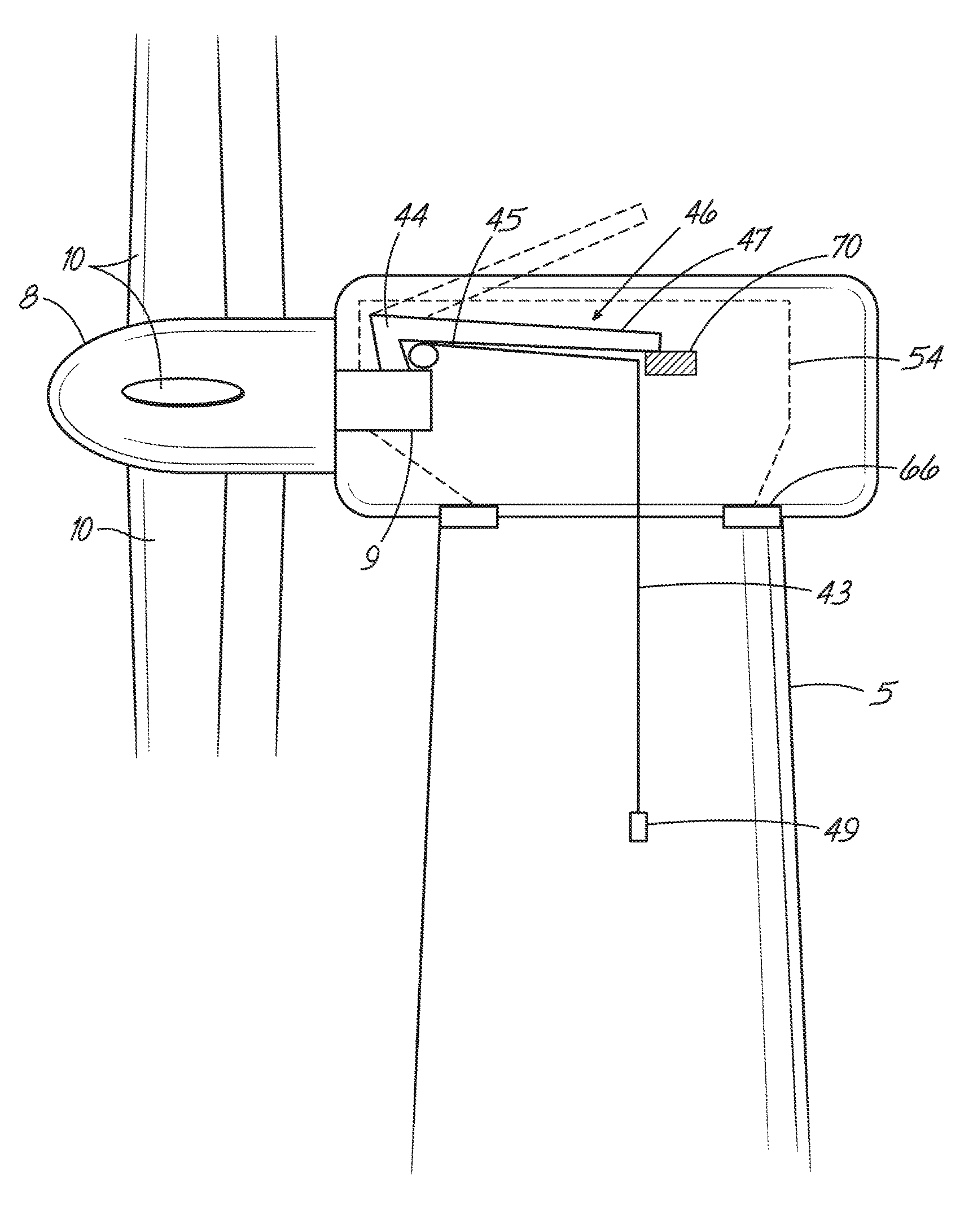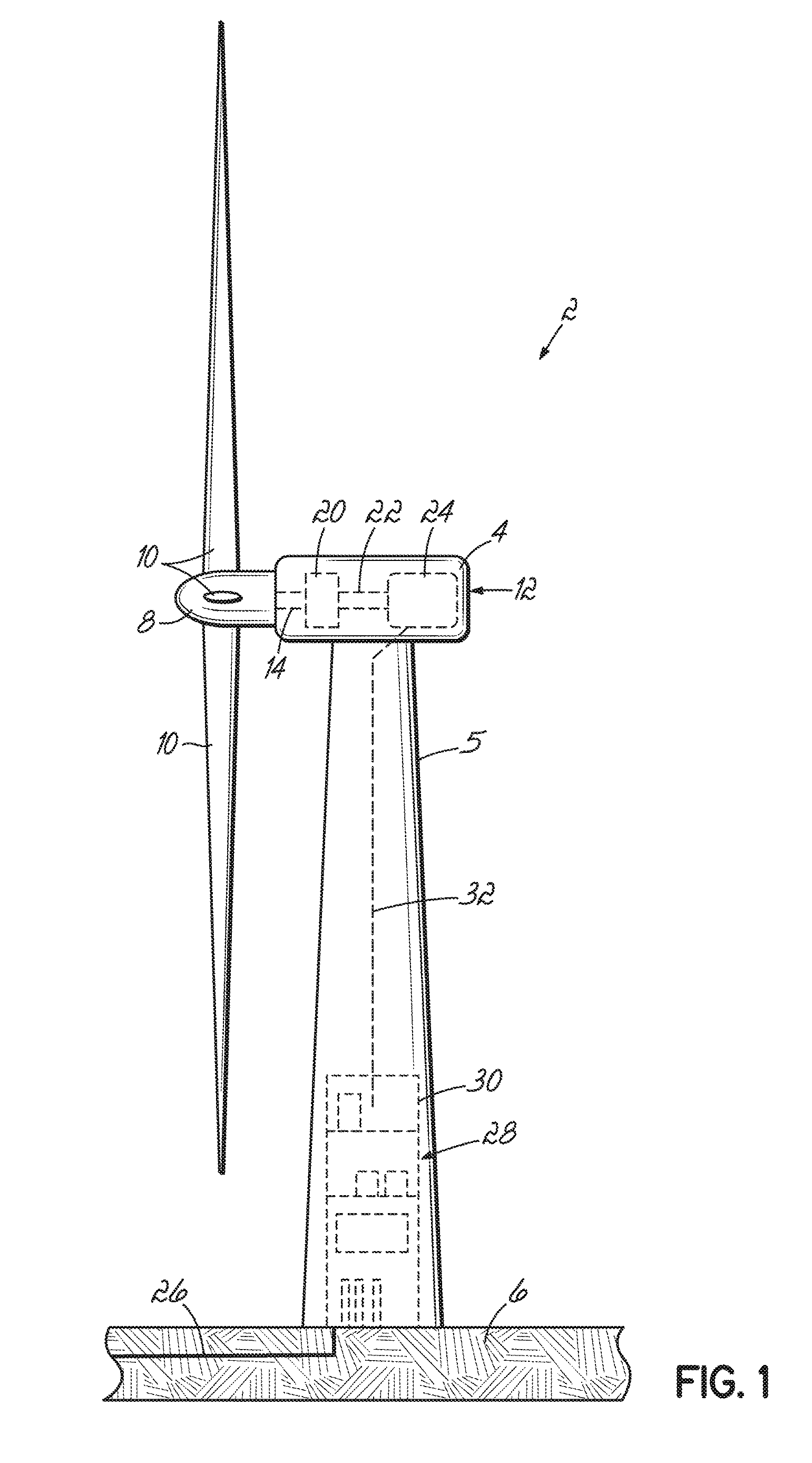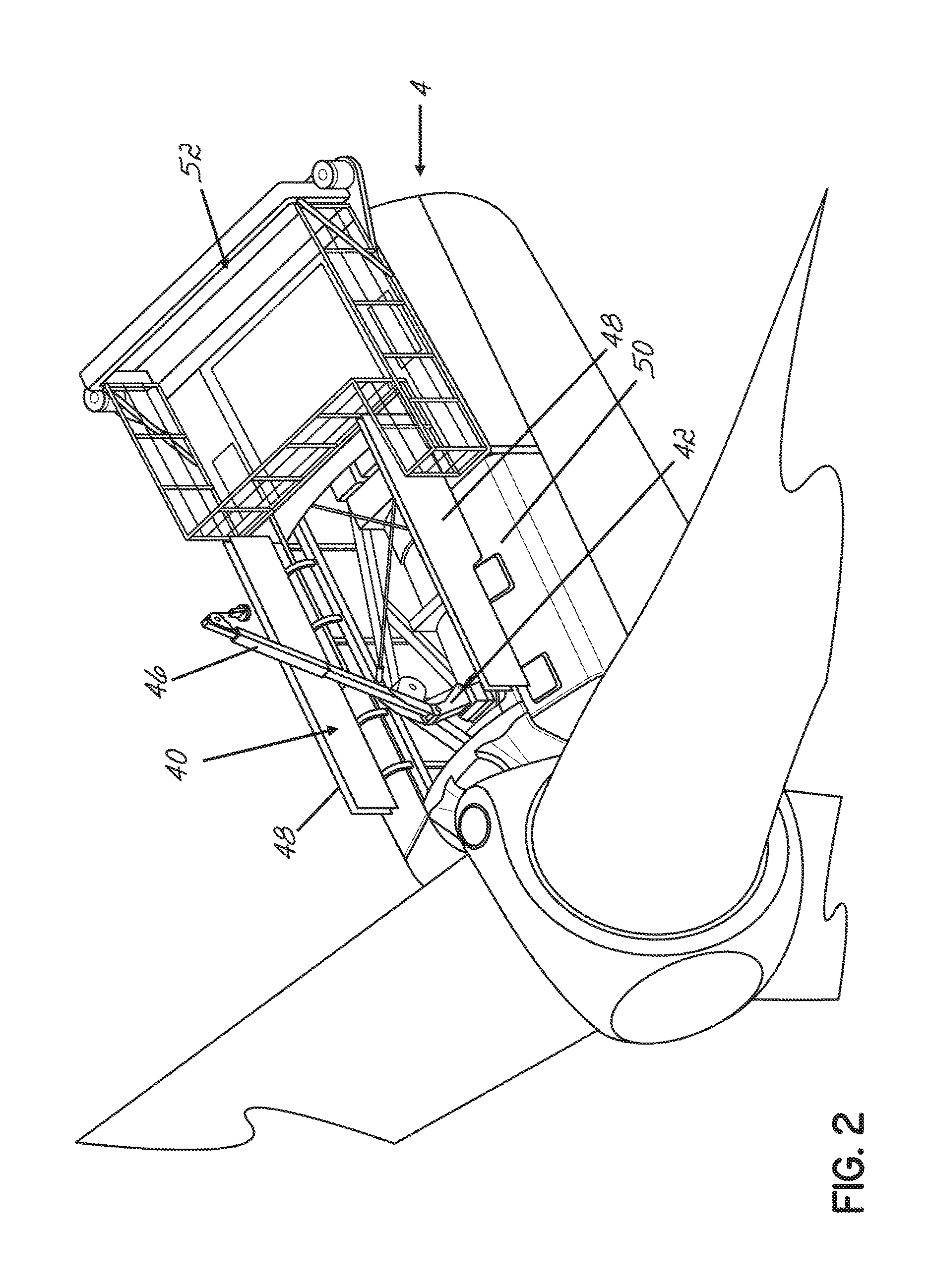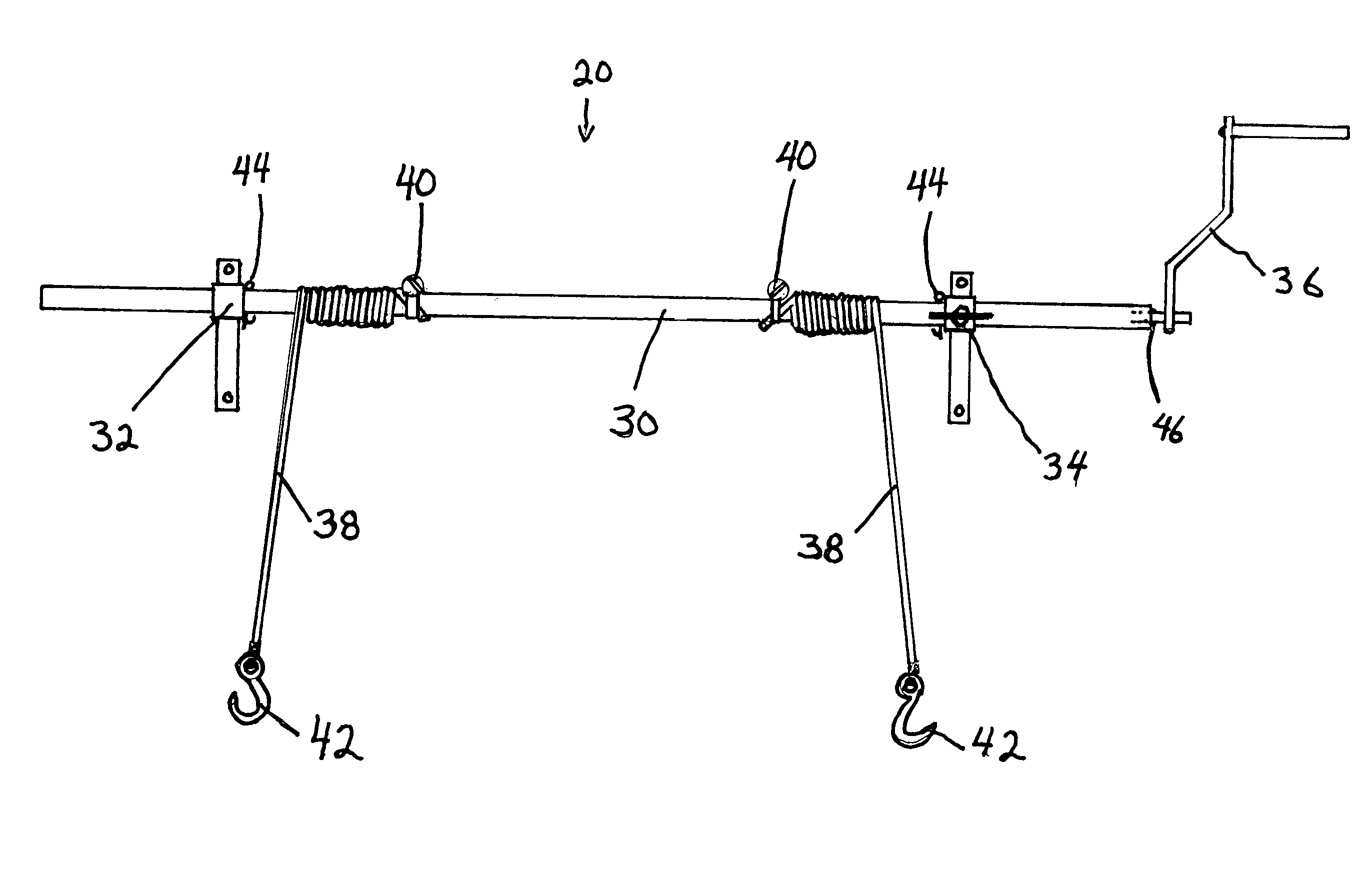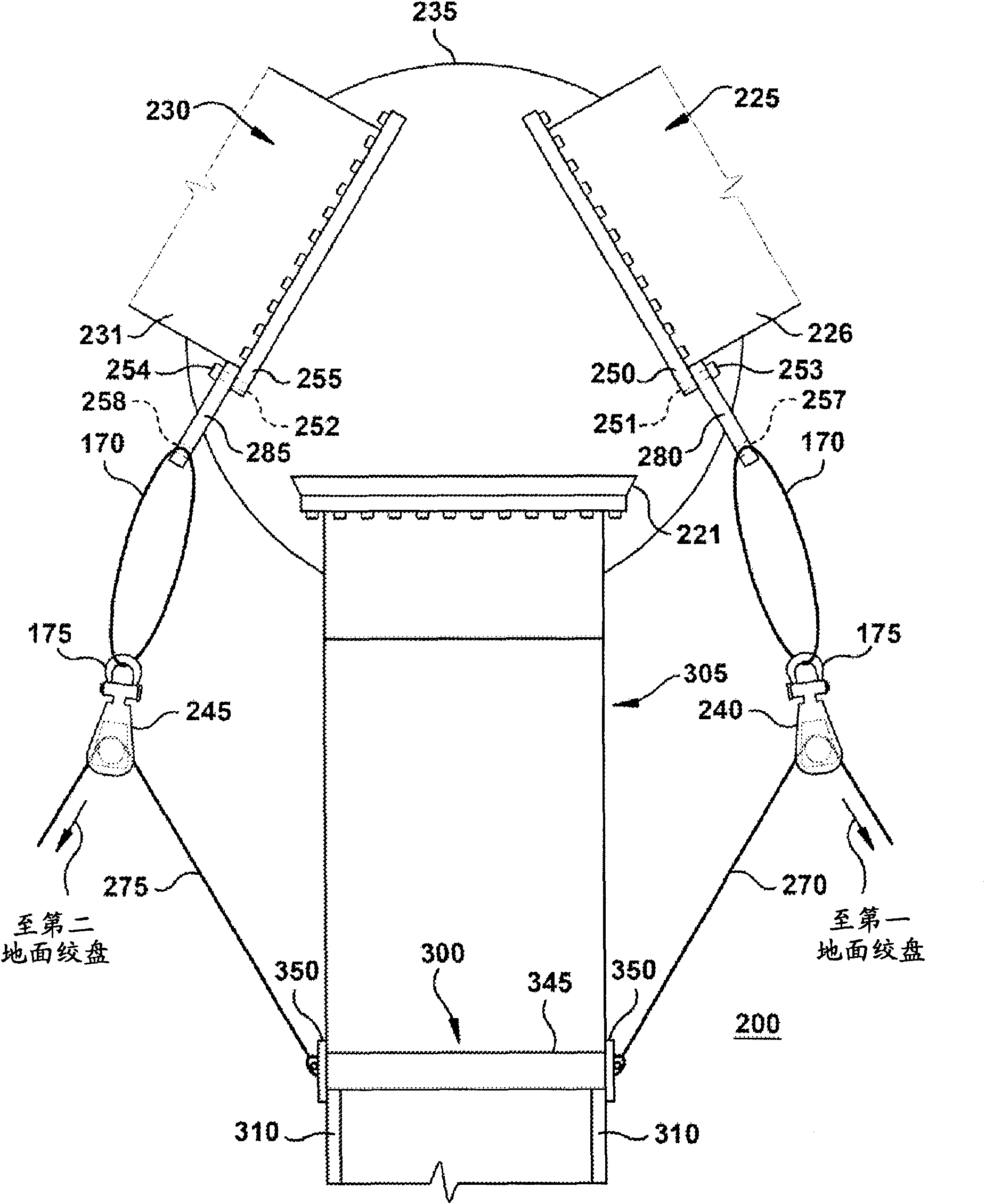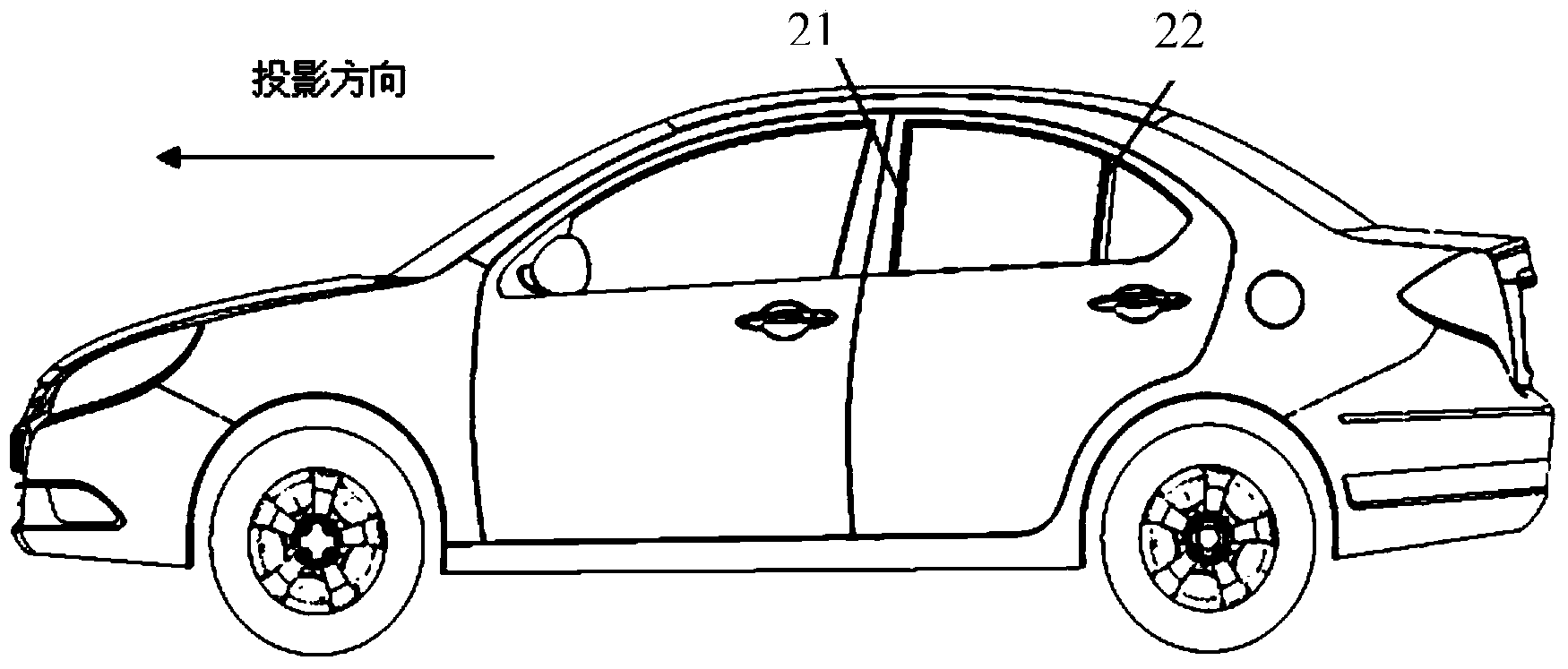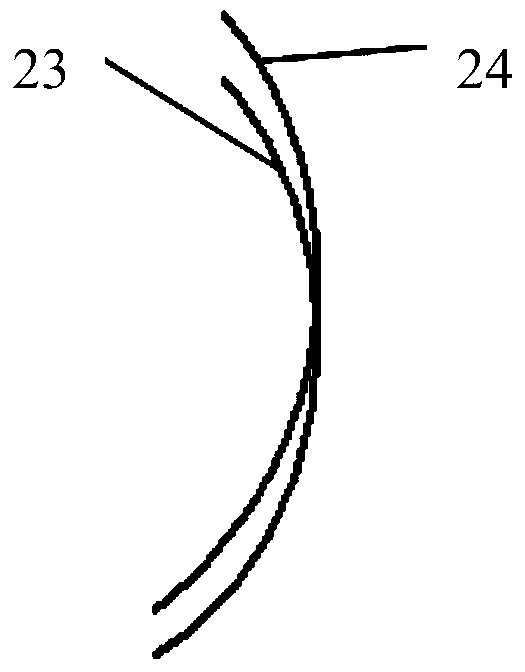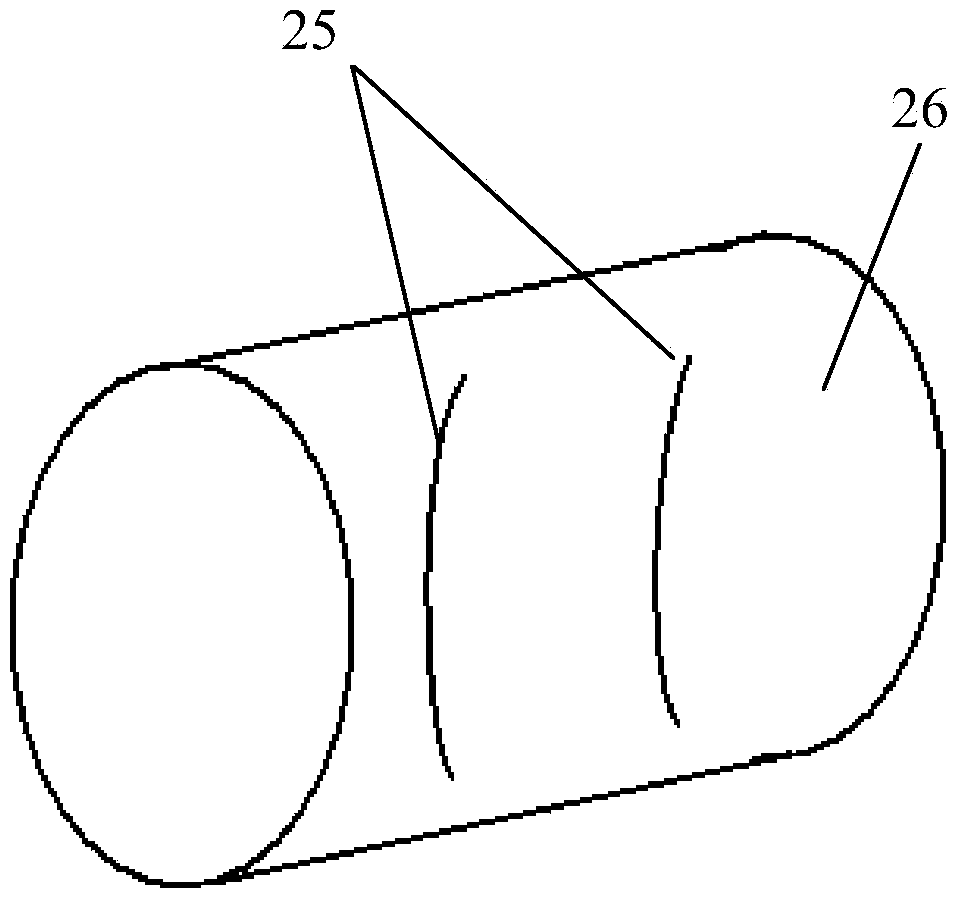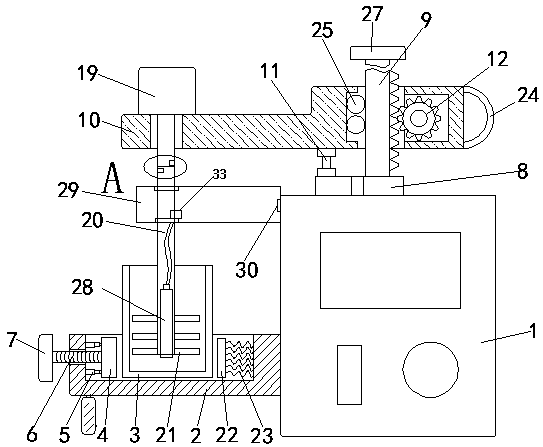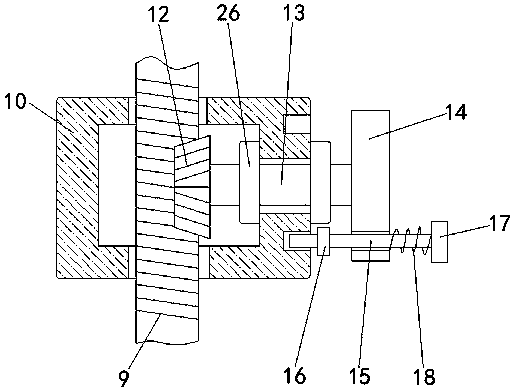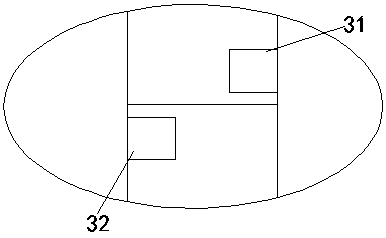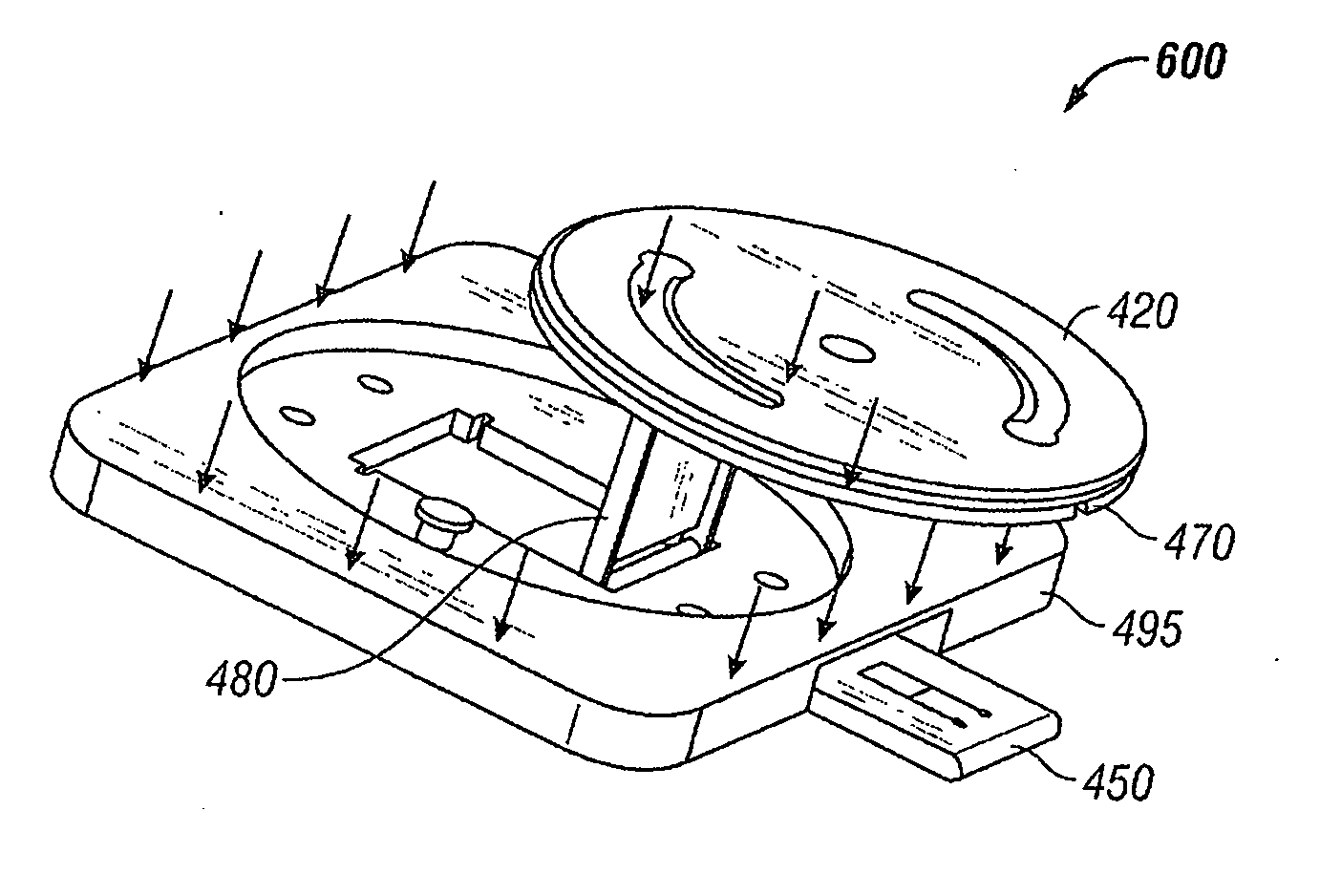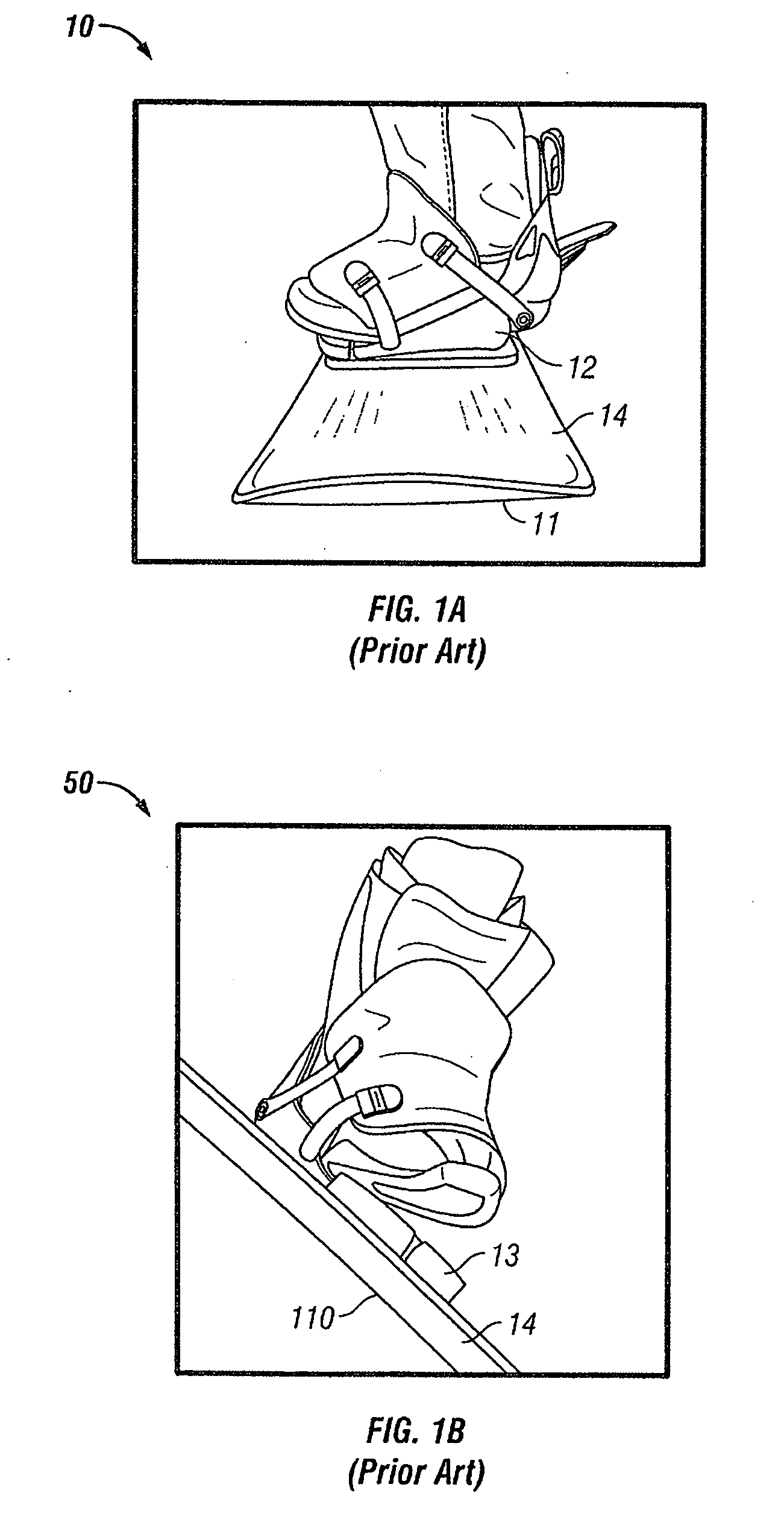Patents
Literature
Hiro is an intelligent assistant for R&D personnel, combined with Patent DNA, to facilitate innovative research.
171 results about "Lift line" patented technology
Efficacy Topic
Property
Owner
Technical Advancement
Application Domain
Technology Topic
Technology Field Word
Patent Country/Region
Patent Type
Patent Status
Application Year
Inventor
Lowering and raising a single wind turbine rotor blade from six-o'clock position
InactiveUS20100139062A1Prevent insufficient load capacityMetal-working apparatusWind motor assemblyLift lineWinch
A method and lifting arrangement for lowering and raising a single rotor blade of a wind turbine from a six-o'clock position is provided. Lifting fixtures are symmetrically installed on a hub surface about the rotor blade being replaced. Lifting lines from coordinated ground winches pass over the lifting fixtures to support the blade and attach to a blade harness. The blade harness attaches over a substantial length of the rotor blade, distributing the blade weight broadly. A tail pick crane facilitates transfer of the rotor blade between a vertical and a horizontal position stored position.
Owner:GENERAL ELECTRIC CO
Closed-loop force controlled body weight support system
A body weight support system that monitors and controls the level of support force within a stepcycle to result in normative center of mass movement and ground reaction forces. The system comprises a harness connected to a lift line which in turn is connected to a means for advancing and retracting the lift line. A control system is configured to monitor load on the cable and to regulate lift line advancement and retraction in response to load information. The support system can be combined with a treadmill for locomotor training of a subject.
Owner:RGT UNIV OF CALIFORNIA
Drilling and producing deep water subsea wells
InactiveUS6968902B2Efficient separationMinimize flow disturbanceWaste water treatment from quariesLiquid separation auxillary apparatusOcean bottomWell drilling
Subsea wells are drilled and completed with an offshore floating platform in a manner that allows simultaneous work on more than one well. A first well is drilled and cased. Then a tubing hanger is run through a drilling riser and landed in the wellhead housing. Then, with the same floating platform, the drilling riser is disconnected and moved to a second well. While performing operations on the second well, the operator lowers a production tree from the floating platform on a lift line, and connects it to the first wellhead housing. An ROV assisted subsea plug removal tool is used for plug removal and setting operations. Seabed separation is configured upstream of a production choke valve.
Owner:VETCO GRAY
Closed-loop force controlled body weight support system
InactiveUS7381163B2Control fluctuationsRestrict levelComputer controlSimulator controlSupporting systemControl system
A body weight support system that monitors and controls the level of support force within a stepcycle to result in normative center of mass movement and ground reaction forces. The system comprises a harness connected to a lift line which in turn is connected to a means for advancing and retracting the lift line. A control system is configured to monitor load on the cable and to regulate lift line advancement and retraction in response to load information. The support system can be combined with a treadmill for locomotor training of a subject.
Owner:RGT UNIV OF CALIFORNIA
Plug installation system for deep water subsea wells
A plug retrieval and installation tool is used with a subsea well having a production tree, a tubing hanger, a passage that extends vertically through the tubing hanger and the tree, and a plug located within a plug profile in the passage within the tubing hanger. The plug retrieval device has a housing and connector that is lowered on a lift line onto the upper end of the tree. An axially extendible stem in the housing is moved with hydraulic fluid controlled by an ROV into the production passage of the tubing hanger. An installation and retrieval member mounted to the stem engages the plug and pulls it upwardly in the passage while the stem is being moved upward, and pushes the plug downward to install the plug while the stem is being moved downward. The connector, drive mechanism and retrieval member are powered by an ROV.
Owner:VETCO GRAY
Portable apparatus for moving subjects
A portable apparatus for moving subjects is claimed in which a base structure has one or more rolling devices attached to facilitate moving of the apparatus. A stem structure rising from the base structure in turn supports a moveable support arm having a having pulley affixed to a distal end. A moveable lifting line capable of supporting a lifted subject ends in a fitting. A pulling mechanism is attached to the apparatus and operably coupled to the lifting line, whereby a subject secured to the fitting can be lifted and moved. In disclosed preferred embodiments, the portable apparatus for moving subjects is configured for lifting a subject without lifting movement of the support arm.
Owner:MASTERSON JR RUSSELL P
Coordinated control of two shipboard cranes for cargo transfer with ship motion compensation
The present invention is typically embodied to exert active control of two same-shipboard cranes performing joint lifting of a payload. Sensory signals indicative of ship motion, and of luff angle and hoist line length of both cranes, are transmitted to a computer. The sensory signals are processed by the computer using a ship motion cancellation algorithm, which solves for values of the respective luff angles and hoist line lengths of both cranes, such values achieving static equilibrium (e.g., zero motion horizontally, vertically, and rotationally in the same vertical geometric plane) of the suspended payload. Inverse kinematic control signals in accordance with the mathematical (e.g., minimum norm) solutions are transmitted by the computer to respective luff angle actuators and hoist line length actuators of both cranes so that the suspended payload tends toward steadiness. Inventive control thus acts on a continual basis to significantly reduce pendulation during the two-crane lifting operation.
Owner:THE UNITED STATES OF AMERICA AS REPRESENTED BY THE SECRETARY OF THE NAVY
Method and apparatus for telescoping boom with hydraulic extension actuators
A method of constructing a five section telescoping aerial lift, crane or similar vehicle-mounted equipment and a lift constructed in accordance with the method having one end pivotally secured, about a horizontal axis, to the pedestal and the other end of the telescoping boom is equipped with a sheave for rigging the turret winch lift-line and / or it is equipped with a platform assembly for positioning workers, tools, or other devices at high positions, the four telescoping boom sections being extended and retracted individually by means of one hydraulic actuator for each moving section, two actuators located in the interior of the boom sections and two actuators located on the exterior of the boom sections.
Owner:ELLIOTT EQUIP
Prediction of dynamic ground effect forces for fixed wing aircraft
InactiveUS20050197811A1Design optimisation/simulationSpecial data processing applicationsEngineeringLift line
Embodiments of the present invention relate to methods for calculating the aerodynamic forces and moments on fixed wing aircraft experiencing dynamic ground effects in subsonic flight. An airfoil and its trailing vortices are modeled as a lifting line with trailing vortex sheets and an image lifting line with trailing vortex sheets. The lifting line is located at a certain height above the ground and its image is located at an equal height below the ground, in order to satisfy a boundary condition of zero normal velocity at the ground. A downwash velocity at the airfoil is expressed as the sum of the downwash velocities from the lifting line and its image and is dependent on the height above the ground. The angle of attack of the airfoil is then expressed as a function its downwash velocity, the geometry of the airfoil, and a series representation of its vorticity distribution. The vorticity distribution is calculated from the angle of attack by numerical substitution. Aerodynamic forces and moments on the airfoil are calculated from the vorticity distribution. In another method, a lifting surface and image lifting surface are used to model an airfoil. These methods have particular use in autoland systems, autopilot systems and computer simulations.
Owner:HONEYWELL INT INC
Apparatus for the latching and unlatching of a load
InactiveUS7506907B1Shorten operation timeSafe and efficient releaseThin material handlingLoad-engaging elementsDrive shaftRemote control
An improved apparatus for latching and unlatching a load from a sling comprises a housing attachable to a load lift line extending from a crane or other similar equipment. Contained at least partially within the housing is a load engaging assembly including a latch, such as a conventional sling hook used to attach a load containing sling. The load engaging assembly further includes a latch attachment assembly and an unlatching trigger assembly. The apparatus further includes a load activated lock operatively attached to the latch attaching assembly to latch and unlatch the load engaging assembly. The load activated lock includes a support structure affixed to the housing, a latch activating member slidably mounted on the support structure and a movable locking structure positioned within the housing and operatively adjacent the latch activating member to engage and prevent latch activating member from sliding movement when a load is applied to the latch. The apparatus further includes a compression switch affixed to the housing at a position to be activated when a load of a predetermined weight is attached to the latch. The apparatus further includes at least one remote controlled relay switches electrically connecting the compression switch, or alternatively a second compression switch, to the power unit of an adjustable clutch motor having a rotating drive shaft. The apparatus also including a remote control broadcasting device to emit predetermined signals to close at least one of the remote controlled relay switches. The drive shaft is attached a reel line affixed at its opposite end to the latch activating member. The drive shaft when activated will cause the reel line retract to operatively cause the latch activating member to move and cause the latch to be positioned for releasing the sling from the latch.
Owner:MARLER JOSEPH E
Riser release flaring system for parafoils
ActiveUS20170297724A1Large internal pressureImprove performanceParachutesNon-rigid airshipsLine tubingFlight vehicle
Described herein are features for a riser release flaring system for parafoils and other descent flight vehicles for controlled descent and landing of the flight vehicle. The descent flight vehicle may have a payload suspended by a canopy. The descent flight vehicle may be released from a high altitude lighter-than-air (LTA) system, from another system, or may not be associated with any other flight system. The riser release auto flare system is used with the descent system, such as the parafoil, for controlled and safe landing of the payload. Riser lines are released at a controlled rate and for a fixed distance to automatically cause the payload to pull control lines to flare the parafoil and slow a descent and / or forward speed of the vehicle. The riser lines may be released in response to the descent system satisfying a landing criterion, such as altitude.
Owner:WORLD VIEW ENTERPRISES
Air food-passing robot and food-passing method thereof
ActiveCN105159303AHigh trafficReasonable allocation of resourcesPosition/course control in two dimensionsMicrocontrollerLiquid-crystal display
An Air food-passing robot comprises two transmission wheels arranged in a transmission track. One end of each transmission wheel is connected with a servo motor, and the other end is connected with a connecting rod through a servo motor rotation shaft. The connecting rods are in circuit connection with a microcontroller. A stepping motor rotation shaft is connected with a food-passing container through a lifting line. The food-passing method comprises the steps of: 1) a service plate containing food is put into the food-passing container, a table number is input, a digital tube displays the table number, and a liquid crystal displays the food name; 2) the microcontroller controls a stepping motor to work, and the stepping motor lifts the food-passing container; 3) the microcontroller controls the servo motors to work so as to drive the two wheels to move towards a target dining table; 4) after a magnetic field, a reed relay is closed, and when the value of a counter is equal to the table number, the two wheels arrives the part above the target dining table; 5) the stepping motor rotation shaft drives the food-passing container to decrease, and a food taking port is closed of the food is taken out; and 6) the food-passing container rises to the original height again, and servo motors return to the original positions. The food-passing robot is safe, highly-efficient, convenient to operate and intelligent.
Owner:SHAANXI UNIV OF SCI & TECH
Cord tension control for top down/bottom up covering for architectural openings
ActiveUS20110265963A1Avoiding entanglement of the lift cordsAvoid entanglementDoor/window protective devicesCurtain accessoriesAbutmentScrew thread
Cord tensioning systems are provided for top down / bottom up coverings to prevent entanglement of lift cords about associated wrap spools by correlating rotation of the wrap spools with translating threaded nuts mounted on threaded shafts rotating in unison with the wrap spools whereby abutment of nuts associated with lift spools prevent over movement of rails associated with the spools and thus entanglement of the lift cords associated therewith.
Owner:HUNTER DOUGLAS INC
Drilling and producing deep water subsea wells
InactiveUS20060011348A1Efficient separationImprove efficiencyWaste water treatment from quariesLiquid separation auxillary apparatusTubing hangerRespirator
Subsea wells are drilled and completed with an offshore floating platform in a manner that allows simultaneous work on more than one well. A first well is drilled and casing. Then a tubing hanger is run through a drilling riser and landed in the wellhead housing. Then, with the same floating platform, the drilling riser is disconnected and moved to a second well. While performing operations on the second well, the operator lowers a production tree from the floating platform on a lift line, and connects it to the first wellhead housing. An ROV assisted subsea plug removal tool is used for plug removal and setting operations required through the production tree.
Owner:VETCO GRAY
A nacelle for a wind turbine generator including lifting apparatus
ActiveUS20170022966A1Easy to wearImprove reliabilityEngine manufactureFinal product manufactureNacelleLift line
A nacelle for a wind turbine generator comprises a crane articulated on a base fixed to said nacelle. The crane includes a cantilevered telescopic boom, a principal winch with a lifting line and respective azimuth and elevation drive units for moving said boom in azimuth and in elevation relative to said nacelle. The crane has a deployed condition in which said boom is moveable in azimuth and in elevation and a stowed condition. The nacelle comprises a support structure against which said boom is brought to rest in said stowed condition thereof and wherein when in said stowed condition said boom is located into a predetermined position at which it is held to rest at a point along its length against said support structure and wherein said lifting line is in a reference position in relation to said nacelle when said crane is in its stowed condition. A method for operating a crane in a nacelle comprising operating said crane as a static hoist using a principal winch of said crane when in said stowed condition of said crane.
Owner:VESTAS WIND SYST AS
Device for mounting on a vehicle for hoisting and transporting a big-game carcass
Owner:BILCIK LAWRENCE STEPHEN
Method and arrangement for removing and lifting a blade pitch slewing ring bearing of a wind turbine
A method and an arrangement for removing and lifting of a blade pitch slewing ring bearing of a wind turbine after a blade from a rotor hub of the wind turbine is removed, is disclosed. The arrangement and method enables the lowering and lifting of the wind turbine without the need of large and heavy cranes so that the replacement can be carried out cost effectively. The arrangement includes a first pulley mounted at the bottom of the wind turbine, a second pulley mounted inside a rotor hub, a lifting line running over the first pulley, the second pulley and further over a third pulley mounted inside a carrier. The carrier supports the blade pitch slewing ring bearing during lifting and lowering which is achieved through a coordinated operation of a ground winch, the lifting line and tag lines. Further, rigging equipment is attached to the lowered blade pitch slewing ring bearing to enable easy transportation.
Owner:WINDCARE INDIA PVT
Lowering and raising a single wind turbine rotor blade from six-o'clock position
An arrangement 200 and method for lowering and raising a single rotor blade 305 of a wind turbine 30 from a six-o'clock position is provided. Lifting fixtures 240, 245 are symmetrically attached on a rotor hub 235 at pitch bearing flanges for rotor blades 225, 230 about the rotor blade 305 being replaced. Lifting lines 270, 275 from coordinated ground winches 60 pass over the lifting fixtures 240, 245 to support the blade 220, attaching to a blade harness 300. The blade harness 300 attaches over a substantial length of the rotor blade 220, distributing the blade weight broadly. A tail pick crane 80 facilitates transfer of the rotor blade 220 between a vertical position and a horizontal position stored position.
Owner:GENERAL ELECTRIC CO
Self-contained self-elevating platform lift
InactiveUS7963505B2The process is compact and efficientSimple designCurtain suspension devicesFiling appliancesLift lineHorizontal and vertical
Owner:TAYLOR JAMES E +1
Manufacturing method for lifting guide rail of side window glass of automobile
ActiveCN103696645APurposefulMeet the design requirementsWing arrangementsWing suspension devicesLift lineEngineering
The invention relates to a manufacturing method for a lifting guide rail of a piece of side window glass of an automobile. The method comprises the following steps: selecting a midpoint connected with any point on the glass to be applied for serving as a tangent plane of the glass; extracting the characteristic line of a column B; connecting the characteristic line into a straight line by taking the midpoint in the tangent plane as an original point, and forming a normal plane of the straight line on the midpoint; projecting the characteristic line on the normal plane to obtain a projection line, forming a circle by selecting any three points from the projection line, and forming a cylindrical face; changing included angles between the midpoint of the tangent plant and the straight line of the characteristic line as well as between the midpoint of the tangent plant and the characteristic line to make intersecting lines fit the characteristic line of a boundary virtual guide rail, which is opposite to the column B, of the glass, and forming a spiral line fitting the characteristic line of the column B; forming a spiral line of the same thread pitch on another boundary according to the previous spiral line, wherein the two spiral lines are taken as lifting lines of the glass; manufacturing the glass lifting guide rail according to the lifting lines.
Owner:ANHUI JIANGHUAI AUTOMOBILE GRP CORP LTD
Rail transit track beam turnout mechanism
The invention relates to the technical field of rail transit, and discloses a rail transit track beam turnout mechanism, the rail transit track beam turnout mechanism comprises a fixed beam paved witha first traveling rail, at least two forked beams paved with a second traveling rail, a swinging beam arranged between the fixed beam and the forked beams, and a plurality of limiting devices arranged on the fixed beam and / or the swinging beam, wherein one end of each forked beam is an alignment end, and the limiting devices are used for limiting the movement of the first traveling rail at the turning position in the Y direction. The turnout mechanism provided by the invention realizes the line switching by independently arranging the swinging beams capable of swinging on the basis of simplifying the integral structure of the turnout mechanism and improving the line switching efficiency, and reduces the deformation of a variable track to the first traveling rail during the line switching,and the service life of the swinging beam and the integral stability of the turnout mechanism are improved.
Owner:曾鉴
Lifting-type water quality online analyzer sampling apparatus
PendingCN107727441AAct as an elastic bufferGuaranteed accuracyWithdrawing sample devicesTesting waterWater qualityLift line
The invention discloses a lifting-type water quality online analyzer sampling apparatus. The lifting-type water quality online analyzer sampling apparatus comprises an analyzer body, wherein the bottom of one side of the analyzer body is fixedly connected with a bearing platform, the top of the bearing platform is provided with a holding groove, a water sample cup is arranged in the holding groove, the interior of the holding groove is connected with a fixed plate in a sliding manner, one side of the fixed plate pushes against the outer wall of the water sample cup, one side, which is away from the water sample cup, of the fixed plate is connected with the inner wall of the holding groove by virtue of a plurality of stretchable rods, one side, which is close to the stretchable rods, of thefixed plate is connected with a threaded rod in a rotating manner, the inner side wall of the holding groove is provided with a threaded opening corresponding to the threaded rod, and one end, whichis away from the fixed plate, of the threaded rod penetrates through the threaded opening and extends outwards. By arranging multiple transmission mechanisms and fixing mechanisms, the water sample cup can be effectively fixed by the apparatus, and a collected water sample can be stirred, so that the stability of the water sample cup and the accuracy of an analysis result can be ensured.
Owner:河北华厚天成环保技术有限公司
Stabplate connections
Owner:GE OIL & GAS UK LTD
Auxiliary device assisting physically-challenged person without arms in putting on or taking off trousers
Owner:QILU UNIV OF TECH
Self-Contained Self-Elevating Platform Lift
InactiveUS20100051888A1Simple designMinimal costCurtain suspension devicesFiling appliancesLift lineEngineering
Owner:TAYLOR JAMES E +1
Personal lifting device
Owner:TINDALL JARY EDWARD
Hinged rotatable binding system for snowboards
InactiveUS20090273163A1Simpler and light weightRelieve pressureCarriage/perambulator accessoriesSki bindingsEngineeringLift line
A hinged rotatable binding system for snowboards that eliminates leg pain while on the chair lift and in movement through lift lines. The binding system includes a base plate which is fixed to the snowboard and a top rotating plate which is mountable to a boot binding harness. A hinge plate connects the base plate to a mid static disk. The binding system includes a latch lever which acts as a hands-free locking system that is mounted through an outer ridge of the base plate and connected to a retractable plunger. The binding system is provided with an internal hinge and a number of friction plates therefore, fewer parts are needed. The hinged rotatable binding system for snowboards is a cost effective and light weight model with simple assembly features.
Owner:SNOWBOARD SPORT SOLUTIONS
Optimization calculation method of alignment adjustment scheme of vertical section of high-speed railway in operation
ActiveCN109165427AImprove riding performanceReduce the amount of renovation workGeometric CADConstraint-based CADEngineeringCalculation methods
The invention discloses an optimization calculation method of an alignment adjustment scheme of the vertical section of a high-speed railway in operation, which takes into account the alignment control requirements of high speed railway profile and the adjustable range limits of adjustment measures, and which obtains an optimized alignment adjustment scheme by constructing a series of optimizationmodels such as a single slope adjustment optimization test model, a multi-slope section optimization calculation model, a whole slope section set range optimization calculation model and a vertical curve optimization calculation model and by optimization and solving. The method includes the following steps: S1, acquiring the profile data of high-speed railway; S 2, setting that profile control parameters of the vertical section of the high-speed railway; S3, carrying out slope adjustment optimization test of single slope section of high-speed railway vertical section; S4, carrying out slope adjustment optimization calculation of multi-slope section of high-speed railway vertical section; S5, carrying out slope adjustment optimization calculation of the whole slope section of the high-speed railway vertical section; S6, carrying out optimization calculation of vertical curve of high-speed railway vertical section. The optimized adjustment scheme obtained by the invention can meet the high-speed railway alignment restriction conditions in the adjustable range, at the same time, the ride comfort of the line can be improved to the maximum extent, and the line renovation engineering quantity can be reduced. The method can be widely used in the optimized design of the alignment adjustment scheme of the vertical section of the operation high-speed railway.
Owner:CHINA RAILWAY DESIGN GRP CO LTD
Method of and system for hauling a marine equipment unit, a marine equipment unit and a carrier
InactiveUS20180327057A1Easy to solveUndesired contactCargo handling apparatusPassenger handling apparatusMarine equipmentLift line
The present document describes a method of hauling an equipment unit from the water onto a carrier. The carrier comprises a hauling ramp, which is arranged for being extended from a loading area into the water. The carrier further includes a first winch, and a suspension structure arranged for being extended outside the carrier over the water and over the hauling ramp. The suspension structure comprises a second winch. The method comprising the steps of: releasing, by the equipment unit, a hauling buoy. The hauling buoy is connected to a tow line extending from the equipment unit, and to a lift line extending from a lifting point on the unit. The method comprises a further step of recovering the hauling buoy from the water, connecting the tow line to the first winch and connecting the lift line to the second winch. Then, the equipment unit is hauled by towing it onto the hauling ramp using the first winch, while simultaneously guiding the equipment unit using the second winch. The method is in particular useful for hauling of an autonomous underwater vehicle (AUV) during bad weather conditions at sea. The document also describes the equipment unit and a system for hauling that can be installed on a carrier, as well as a carrier comprising such a system.
Owner:FUGRO NV
Device for mounting on a vehicle for hoisting and transporting a big-game carcass
InactiveUS20050104052A1Lower center of gravityMeat holding apparatusAnimal huntingSet screwEngineering
A vehicle-mounted device for hoisting and transporting big game such as deer, and more particularly a device for mounting on an all-terrain vehicle such as a quad, is disclosed. The device includes two or more spaced-apart lift lines for encircling the trunk of a big-game carcass so as to hoist and transport the carcass with the trunk extending substantially horizontally. The lift lines are attached to a common reel rotatably mounted to the vehicle. The device includes a hand crank for rotating the reel so as to spool in the lift lines and a hand-manipulable set screw for locking the reel and lift lines during transportation of the carcass.
Owner:BILCIK LAWRENCE STEPHEN
Features
- R&D
- Intellectual Property
- Life Sciences
- Materials
- Tech Scout
Why Patsnap Eureka
- Unparalleled Data Quality
- Higher Quality Content
- 60% Fewer Hallucinations
Social media
Patsnap Eureka Blog
Learn More Browse by: Latest US Patents, China's latest patents, Technical Efficacy Thesaurus, Application Domain, Technology Topic, Popular Technical Reports.
© 2025 PatSnap. All rights reserved.Legal|Privacy policy|Modern Slavery Act Transparency Statement|Sitemap|About US| Contact US: help@patsnap.com
